STAGIUNEA
2024/2025 | 232.
ÉVAD | SEASON

2024/2025 | 232.
ÉVAD | SEASON
ÉVAD | SEASON
KOLOZSVÁRI ÁLLAMI MAGYAR SZÍNHÁZ
TEATRUL MAGHIAR DE STAT CLUJ
HUNGARIAN THEATRE OF CLUJ
JANOVICS JENŐ ÉLETÉBŐL INSPIRÁLÓDVA, VECSEI H. MIKLÓS ÉS NÉMETH NIKOLETT SZÖVEGE ÉS A TÁRSULAT IMPROVIZÁCIÓI ALAPJÁN
INSPIRAT DIN VIAȚA LUI JENŐ JANOVICS, PE BAZA UNUI TEXT DE MIKLÓS VECSEI H. ŞI NIKOLETT NÉMETH, ȘI A IMPROVIZAȚIILOR ECHIPEI DE CREAȚIE
INSPIRED BY THE LIFE OF JENŐ JANOVICS, BASED ON A TEXT BY MIKLÓS VECSEI H. AND NIKOLETT NÉMETH, AND THE IMPROVISATIONS OF THE COMPANY
RENDEZŐ | REGIA | DIRECTED BY IFJ. VIDNYÁNSZKY ATTILA JR.
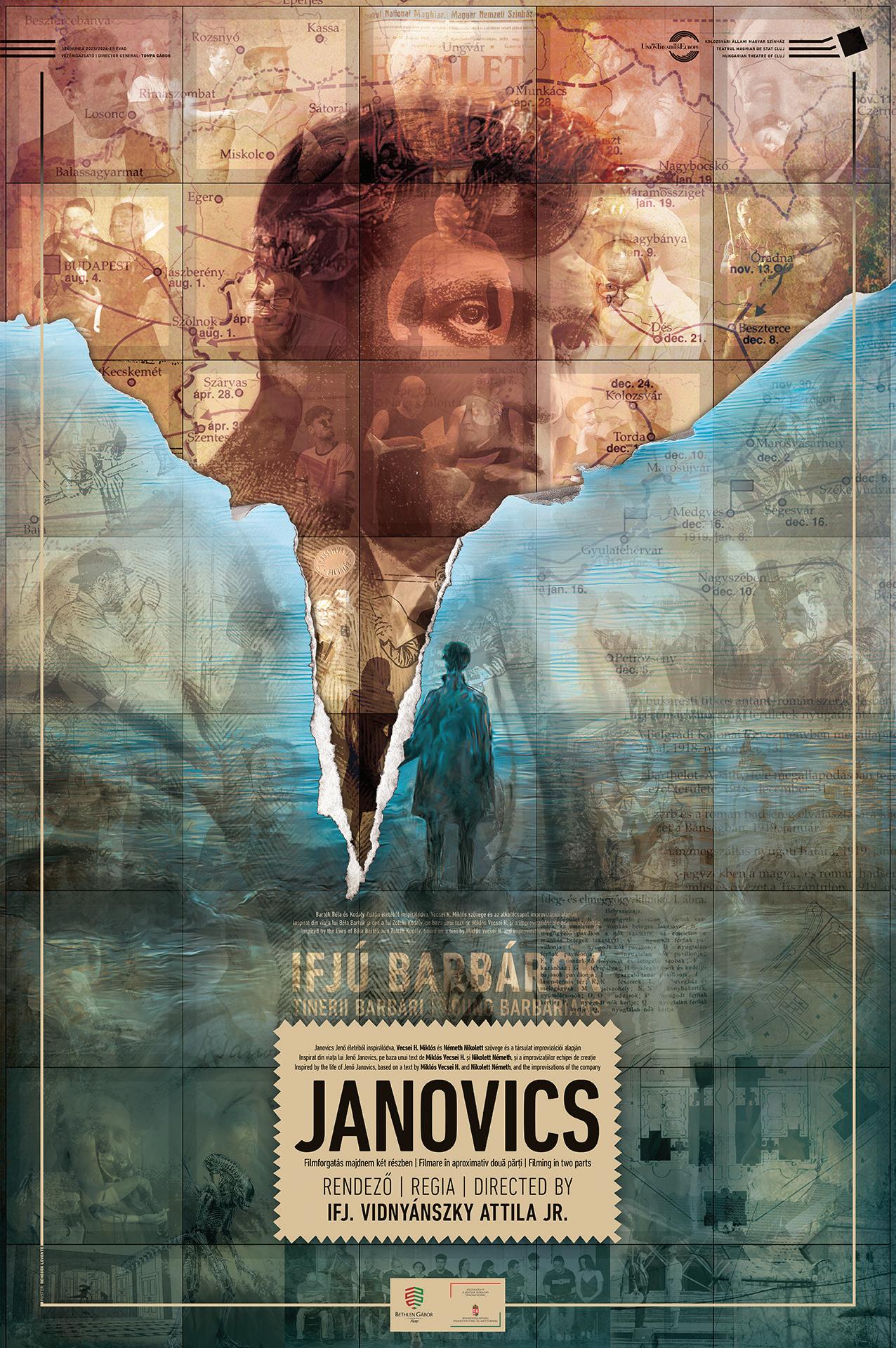
Egy kísérletnek gondolom a Janovics-előadást, mivel ott kezdődik majd, ahol a Barbárok befejeződött. Akár egy sorozat második része, egy láncszem vagy inkább egy kereszteződés. Ahogy a Barbárok, úgy a Janovics sem életrajzi előadás, igyekszik minél távolabb kerülni a színház kereteitől, de a Barbároktól eltérően most az volt a célunk, hogy a főszereplő életének legjelentősebb időszakát meséljük el, Janovics féle „új formában”.
Ifj. Vidnyánszky Attila – az előadás rendezője
Consider spectacolul Janovics ca pe un experiment, deoarece va începe acolo unde s-a terminat
Tinerii barbari. Precum a doua parte a unei serii, o verigă sau mai degrabă o confluență. Asemenea
Tinerilor barbari, nici Janovics nu este un spectacol biografic, el încercând să se îndepărteze cât mai mult posibil de cadrul teatral, dar spre deosebire de Tinerii barbari, în acest caz scopul nostru a fost să povestim cea mai semnificativă perioadă din viața protagonistului, sub o „nouă formă”, à la Janovics.
Attila Vidnyánszky jr. – regizorul spectacolului
I see the Janovics production as an experiment, as it will start where Young Barbarians ended. It's like the second part of a series, a chain link or rather a junction. As with Barbarians, Janovics is not a biographical production, it tries to get as far away from the confines of the theatre as possible, but unlike Barbarians, our aim was to recount the most significant period of the protagonist's life in a "new form", in the Janovics way.
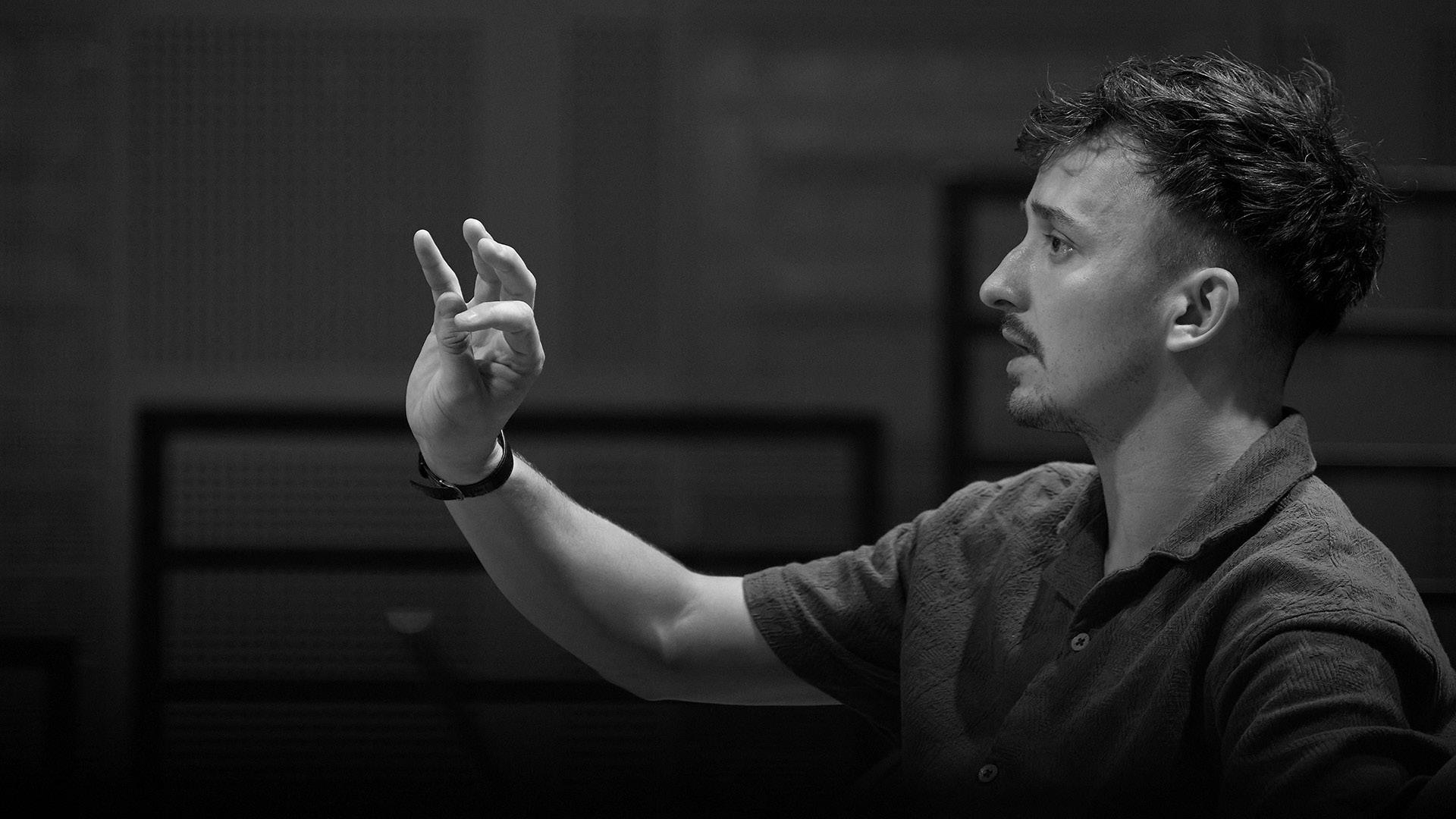
Attila Vidnyánszky jr. –director of performance
ÉVAD | SEASON
PÁSKÁNDI GÉZA
RENDEZŐ | REGIA | DIRECTED BY SZABÓ K. ISTVÁN
A „pornokrácia” kifejezés egy olyan történelmi korszakra utal, amelyet a hatalom és a szexualitás pornográfiája határoz meg: a kurtizánok, ágyasok és érdekházasságok kiemelkedő szereppel bírtak a magasabb hatalmi körökben, különösen a pápai udvarban a IX. század második és a X. század első felében – esetünkben azonban a lehető legátfogóbban utal a hatalom pornográfiájára.
Páskándi Géza Kossuth-díjas erdélyi magyar író, költő, esszéíró, drámaíró, publicista; a Nemzeti
Színház irodalmi tanácsadója volt. Pornokrácia című művét 1990-ben írta, amelyet a rendszerváltás friss élménye ihletett. Tipikus poszt-abszurd (Páskándi gyakori megnevezése szerint: „abszurdoid”)
alkotás, amelyet a dráma előszavában, többek között, eképpen vezet fel: „E groteszk drámában bohóc-irónia és pátosz keveredik. Sőt, ők ketten sziámi ikrek is. Egymást tán ellensúlyozók. Sziámi ikrek – a »mérleg jegyében«. Minden jövendő legyilkoltnak megelőlegezem hát a pátoszt és minden győztes túlélőnek az iróniát. Csak így lehetek igazságos művemben.
E színi játék valóban egy neobizantinus császár bukásáról szól. Az analógiákat nem kell keresni, erőltetni – mindig is kézenfekvők. Különben az e éle dolgozatok sohasem csak egyetlen országról szólanak.”
(Részlet a Pornokrácia előszavából)
E műhöz a forradalmi kontextus a kulcs tehát. Az elnyomó diktatúra pornográfiáját helyezi górcső alá a Ceaușescu házaspár bukásának (és kivégzésének) allegorikus átiratában. A valós történelmi szereplők neobizánci császárrá, annak nejévé, császári udvari szereplőkké, a császár árulóivá, naiv forradalmárokká alakulnak át, de erőteljesen azonosítható a szocialista hatalom ön-átmentésének motívuma is e késői kelet-római korszak párhuzamában. Kisebbségi kérdések, forradalmárok feláldozása, bűnösök keresése kerül középpontba az abszurd elemekkel átszőtt dráma szövegében – mindez úgyszintén a legtágabb, kozmikus értelmezésben. Hiszen végső soron, Páskándi szerint legalábbis, az ember, mint olyan, kisebbségi lény:
„E kozmikus magányban, ahol annyi a csillag, az űr – teméntelen a Túlerő! Az élettelen. Az emberi kisebbség (az emberiség) itt él az élettelen többség tengerében. Ezért mindenki kisebbségi és többségi egyidőben. Ezt tudnia kell. Ez ád érzékenységet, hogy a többi kisebbségek fájdalmait megértse. Ez egyetemes kisebbségi hitvallás.”
Egy kisebbségi (tehár ember) szerző világokat és korokat (át)ölelő abszurdja a legteljesebb káosz korszakából – avagy kései (de nem elkésett), posztumusz ősbemutató a kolozsvári színpadon.
Termenul „pornocrație” se referă la o perioadă istorică definită de pornografia puterii și a sexualității: curtezanele, concubinele și căsătoriile aranjate erau proeminente în cercurile superioare ale puterii, în special la curtea papală în a doua jumătate a secolului al IX-lea și prima jumătate a secolului al X-lea – dar în cazul nostru se referă la pornografia puterii în cel mai cuprinzător mod posibil.
Géza Páskándi este un scriitor, poet, eseist, dramaturg și publicist maghiar transilvănean, laureat al Premiului Kossuth; a fost consilier literar al Teatrului Național. Opera sa Pornocrație a fost scrisă în 1990 și a fost inspirată de schimbarea de regim pe care o trăia atunci. Este o operă post-absurdă tipică (pe care
Páskándi o descrie adesea drept „absurdoidă”) și pe care o descrie în prefața piesei astfel: „În această dramă grotescă, bufoneria ironică și patosul sunt împletite. Mai mult, cele două sunt gemene siameze. Ele se contrabalansează, probabil, una pe cealaltă. Gemeni siamezi – sub «semnul Balanței».
Așadar, anticipez patosul pentru toți viitorii uciși și ironia pentru toți supraviețuitorii victorioși. Numai așa pot fi corect în munca mea.
Această piesă este într-adevăr despre căderea unui împărat neo-bizantin. Analogiile nu trebuie căutate sau forțate – ele sunt întotdeauna evidente. Altfel, astfel de opere nu sunt niciodată despre o singură țară”.
(Fragment din prefața piesei intitulată Pornocrație)
Cheia acestei lucrări este, așadar, contextul revoluționar. Ea se concentrează pe pornografia dictaturii represive într-o transcriere alegorică a căderii (și execuției) cuplului Ceaușescu. Personajele istorice reale sunt transformate într-un împărat neo-bizantin, soția sa, figuri ale curții imperiale, trădători ai împăratului, revoluționari naivi, dar există și o puternică identificare cu motivul auto-redempțiunii puterii socialiste în această paralelă cu perioada romană orientală târzie.
Problemele minorităților, sacrificiul revoluționarilor și căutarea vinovaților se află în centrul textului
acestei piese, care este plină de elemente absurde – toate acestea în sensul cel mai larg, cosmic. La urma urmei, în ultimă instanță, cel puțin potrivit lui Páskándi, omul ca atare este o ființă minoritară:
„În această singurătate cosmică, unde există atât de multe stele, atât de mult spațiu – există atât de mult
Exces de Putere! Cei fără viață. Minoritatea umană (umanitatea) trăiește aici în marea majorității inanimate. Prin urmare, fiecare este minoritate și majoritate în același timp. Trebuie să știți acest lucru.
Aceasta vă dă sensibilitatea de a înțelege durerile altor minorități. Este un crez minoritar universal.”
Absurdul unui autor minoritar (adică uman) din epoca haosului total, care traversează lumi și epoci – sau o premieră postumă, târzie (dar nu întârziată), pe scena Teatrului Maghiar de Stat Cluj.
The term "pornocracy" refers to a historical period defined by the pornography of power and sexuality: courtesans, concubines and arranged marriages were prominent in the higher circles of power, especially in the papal court in the second half of the 9th century and the first half of the 10th century – but in our case it refers to the pornography of power in the most comprehensive way possible.
Géza Páskándi is a Kossuth Prize-winning Transylvanian Hungarian writer, poet, essayist, playwright and publicist; he was a literary advisor to the National Theatre. His work Pornocracy was written in 1990 and was inspired by his then newly experienced regime change. It is a typical post-absurdist work (which Páskándi often describes as "absurdoid"), and which he describes in the preface to the play as "In this grotesque drama, ironic bu oonery and pathos are interwoven. Moreover, the two are Siamese twins. They are, perhaps, counterbalancing each other. Siamese twins – in the "sign of Libra".
So I anticipate pathos for all future slain and irony for all victorious survivors. Only thus can I be just in my work.
This play is indeed about the fall of a neo-Byzantine emperor. Analogies need not be sought or forced – they are always obvious. Otherwise, such works are never about just one country."
(Excerpt from the Preface of Pornocracy)
The key to this work, then, is the revolutionary context. It focuses on the pornography of the repressive dictatorship in an allegorical transcription of the fall (and execution) of the Ceaușescu couple. The real historical characters are transformed into a neo-Byzantine emperor, his wife, imperial court figures, traitors to the emperor, naïve revolutionaries, but there is also a strong identification with the motif of the self-redemption of socialist power in this parallel to the late Eastern Roman period.
Minority issues, the sacrifice of revolutionaries and the search for the guilty are at the heart of the text of this play, which is full of absurd elements - all of this in the broadest, cosmic sense. After all, in the final analysis, at least according to Páskándi, man as such is a minority being:
"In this cosmic solitude, where there are so many stars, so much space – there is so much Excess Power!
The lifeless. The human minority (humanity) is here living in the sea of the inanimate majority. Therefore, everyone is both minority and majority at the same time. You must know this. It gives you the sensitivity to understand the pains of other minorities. It is a universal minority creed."
The absurdity of a minority (i.e. human) author from the era of utter chaos, spanning worlds and ages – or a delayed (but not belated), posthumous premiere on the stage of the Hungarian Theatre of Cluj.
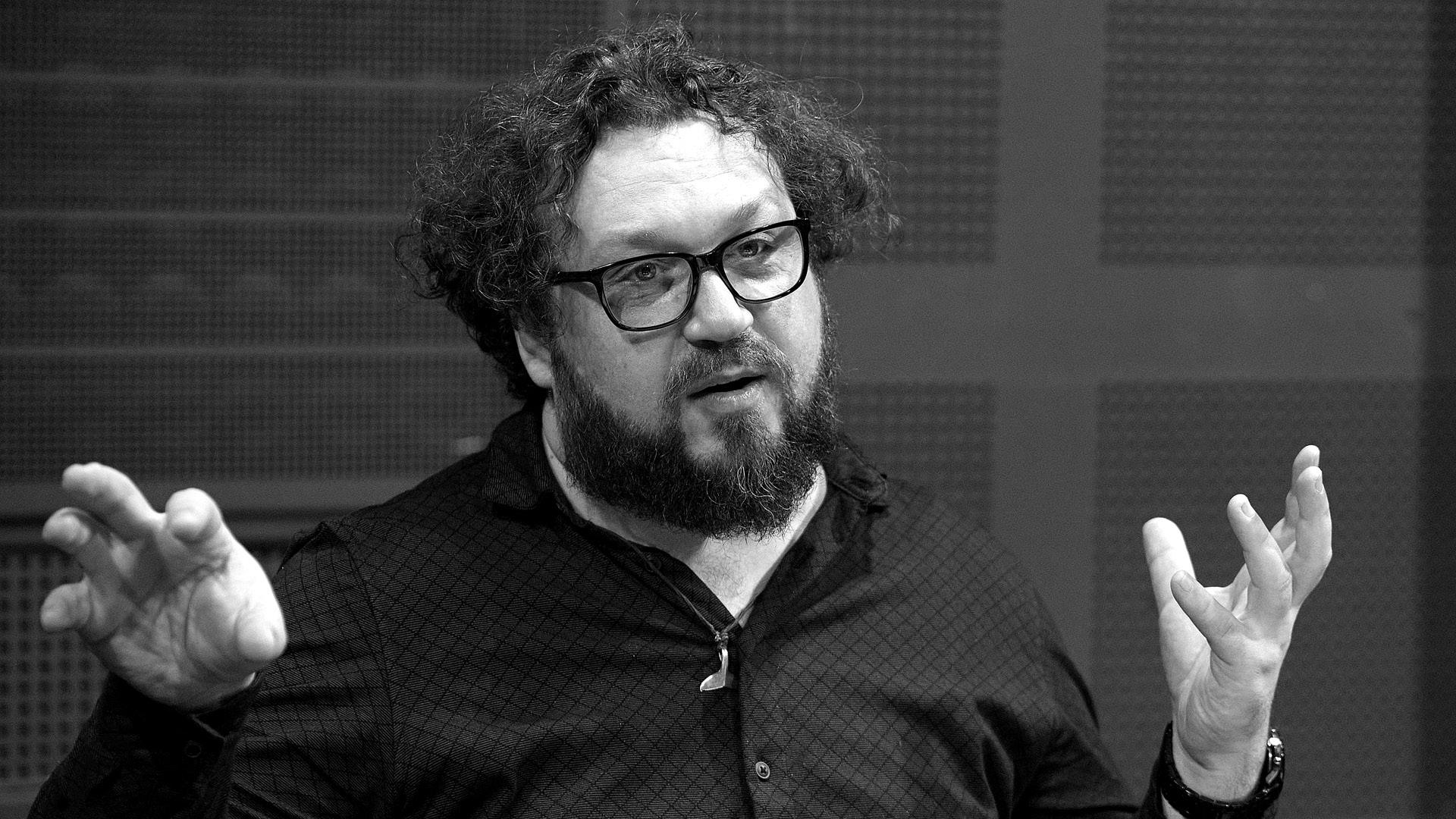
ÉVAD | SEASON
Jon Fosse norvég író, aki 2023-ban elnyerte az irodalmi Nobel-díjat, és az egyik legjelentősebb drámaíró Ibsen óta. Az I Am the Wind című drámája 2007-ben jelent meg.
Az I Am the Wind költői színmű, mely értelmezhető egy halott lélek önmarcangolásaként, aki a halálban sem találva nyugalomra, az élet értelmét próbálja megfejteni. Mindezt Az egyik és A másik nevű szereplők tengeri hajózásának metaforájában megmutatva. Hogy legyen mit elképzelni. Mintha a képzelet jelenléte
az életet feltételezné. Mert ebben a drámában nincs valós tér és idő, minden csak jelzésszerűen működik.
Mintha az élet is csak jelzésszerűen működne.
Hány angyal szállhat egy-egy mondatfoszlány közé préselt csend időtartama alatt, vagy mehet át a színpadon? Mert ezeknek a szereplőknek nagy szüksége volna rájuk. De ezek talán beteg angyalok. És végtére is mindegyik egy dologtól retteg: az elmúlástól.
De addig is, amit tenni lehet, és ami életszerű, az talán ez:
„amit mondok / nem lehet elmondani / De / egészen rövid szünet / de én / egészen rövid szünet / igen én élek / és ezért mondanom kell valamit”
(idézet az I Am the Wind című drámából)
Jon Fosse este un scriitor norvegian, laureat al Premiului Nobel în 2023, care este considerat cel mai important scriitor dramatic de la Ibsen încoace. Piesa I Am the Wind fost publicată în anul 2007.
I Am the Wind este o piesă poetică care poate fi interpretată ca autoimolarea unui suflet mort care, neputându-și găsi pacea în moarte, încearcă să deslușească sensul vieții. Toate acestea sunt dezvăluite în metafora călătoriilor pe mare ale personajelor numite Unul și Celălalt. Pentru a avea ce să îți imaginezi. Ca și cum prezența imaginației presupune viață. Pentru că în această piesă nu există spațiu și timp reale, totul este doar simbolic. Ca și cum viața ar fi doar un act simbolic.
Câți îngeri pot zbura pe scenă în timpul tăcerii intercalate între un fragment de propoziție? Pentru că acești actori ar avea mare nevoie de ei. Dar aceștia sunt probabil îngeri bolnavi. Și la urma urmei, tuturor le este frică de un singur lucru: de trecerea în neființă. Dar, între timp, ceea ce se poate face, și ceea ce este realist, este poate următorul lucru:
„ceea ce spun eu / nu poate fi spus / Dar / o pauză destul de scurtă / dar eu / o pauză destul de scurtă / da sunt în viață / și prin urmare / trebuie să spun ceva”
(citat din piesa I Am the Wind)
Jon Fosse is a Norwegian writer, who won the Nobel Prize in 2023, is considered to be the most important dramatic writer since Ibsen. The play I Am the Wind was published in 2007.
I Am the Wind is a poetic play that can be interpreted as the self-immolation of a dead soul who, unable to find peace in death, tries to unravel the meaning of life. All this is revealed in the metaphor of the sea voyages of characters called The One and The Other. To have something to imagine. As if the presence of imagination presupposes life. Because in this play there is no real space and time, everything is merely symbolic. As if life were only a symbolic act.
How many angels can fly across the stage during the silence spliced between a sentence fragment? Because these actors would need them badly. But these are probably sick angels. And after all, they are all afraid of one thing: passing away.
But in the meantime, what can be done, and what is realistic, is perhaps this:
“what I say / cannot be said / But / quite a short pause / but I / quite a short pause / yes I am alive / and therefore I must say something”
(quote from the play I Am the Wind)
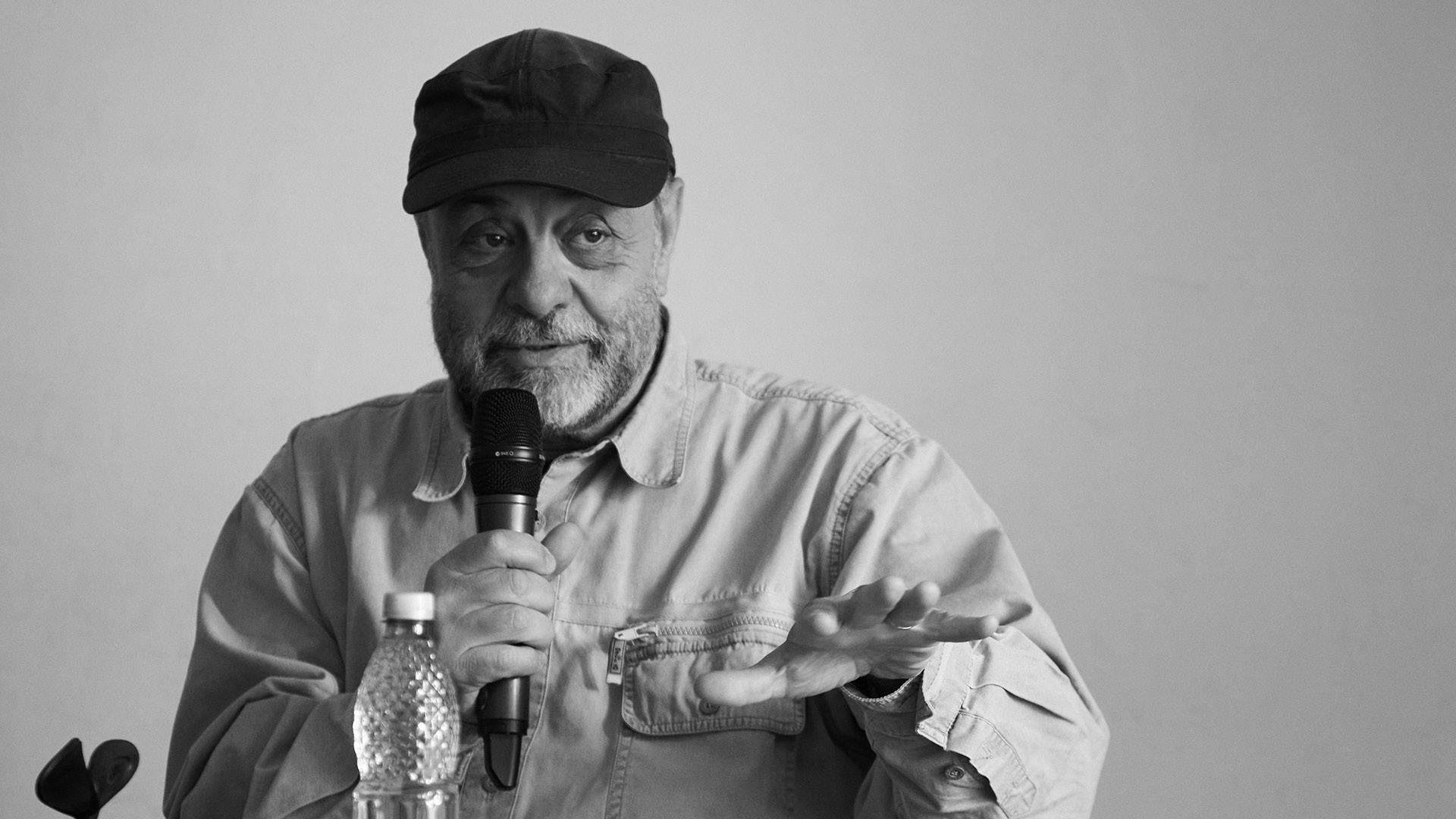
ÉVAD | SEASON
JOE MASTEROFF – JOHN KANDER – FRED EBB
RENDEZŐ | REGIA | DIRECTED BY PUSKÁS ZOLTÁN
Az 1966-ban, a Broadway-en bemutatott kétfelvonásos musical Cristopher Isherwood Berlini történetek című novellafűzére nyomán készült. A többszörösen díjazott zenés műben olyan ismert song-ok kaptak helyet, mint a Wilkommen, a Money, Money, vagy a Mein Herr.
A történet 1931-ben játszódik, Berlinben, a Kit Kat Klub-ban. Sally Bowles amerikai lány, ő a kabaré sztárja, estéről estére osztályrésze a csillogás. Nem riad vissza a férfitársaságtól, karizmáját felhasználja egy lehetséges, szebb jövő reményében; arról ábrándozik, hogy egyszer híres filmcsillag lesz belőle. Ám a fényűző esték csak a látszat, Sally, a reflektorfényen túl napról-napra él kopott albérletében. Itt talál rá a szerelemre Cli ord Bradshaw, szegény és félénk író személyében, akivel közös életről szőnek álmokat. Ekkor tűnik föl a színen a gazdag, sármos Max, aki kedélyes szavaival, fényűző ajándékaival a lányt rögtön leveszi a lábáról. Különös szerelmi háromszög alakul ki Sally, Cli és Max között, estéről estére élnek, habzsolják az életet, mintha nem lenne holnap, csakhogy a holnap mindeközben létezik, és közel sem kecsegtet jóval. A nácizmus napról napra kúszik be a berlini utcák mélyére, és a féktelen hármas élete is megváltozik. És bár a történelem mindent megváltoztat, az élet csak kabaré marad.
Acest musical în două acte, care a avut premiera pe Broadway în 1966, se bazează pe nuvela Berlin Stories a lui Cristopher Isherwood. Musicalul multi-premiat include cântece cunoscute precum Wilkommen, Money, Money și Mein Herr. Suntem la Berlin în 1931, în Kit Kat Klub. Sally Bowles este o americancă, o vedetă a cabaretului, cu strălucirea și fastul aferent seară de seară. Nefiind timidă în ceea ce privește compania masculină, ea își folosește carisma în speranța unui viitor mai frumos; visează să devină într-o zi o celebră vedetă de cinema. Dar serile pline de farmec sunt doar un pretext; Sally trăiește zi de zi dincolo de lumina reflectoarelor, în chiria ei sărăcăcioasă. Aici își găsește dragostea cu Cli ord Bradshaw, un scriitor sărac și timid, cu care visează la o viață împreună. Atunci apare în peisaj bogatul și fermecătorul Max, ale cărui cuvinte frumoase și daruri generoase o cuceresc. Între Sally, Cli și Max se dezvoltă un triunghi amoros ciudat, trăindu-și viețile de parcă nu ar exista ziua de mâine, doar că ziua de mâine este foarte reală și departe de a fi favorabilă. Nazismul se strecoară pe străzile Berlinului cu fiecare zi care trece, iar viețile trioului turbulent se schimbă. Și cu toate că istoria schimbă totul, viața rămâne un cabaret.
This two-act musical, which premiered on Broadway in 1966, is based on Cristopher Isherwood's short story Berlin Stories. The multi-award-winning musical includes such well-known songs as Wilkommen, Money, Money and Mein Herr. 1931, Berlin, Kit Kat Klub. Sally Bowles is an American girl, a star of cabaret, with glitter and glitz as part of her nightly experience. Not shy about male companionship, she uses her charisma in hopes of a brighter future; she dreams of one day becoming a famous film star. But the glamorous evenings are only a pretense; Sally lives day to day beyond the spotlight in her shabby sublet. Here she finds love with Cli ord Bradshaw, a poor and shy writer with whom she dreams of a life together. That's when the rich, charming Max appears on the scene, and his kind words and lavish gifts sweep her o her feet. A strange love triangle develops between Sally, Cli and Max, going from night to night, living life as if there were no tomorrow, only tomorrow is very real and far from auspicious. Nazism is creeping into the streets of Berlin with each passing day, and the lives of the boisterous trio are changing. And although history changes everything, life remains a cabaret.
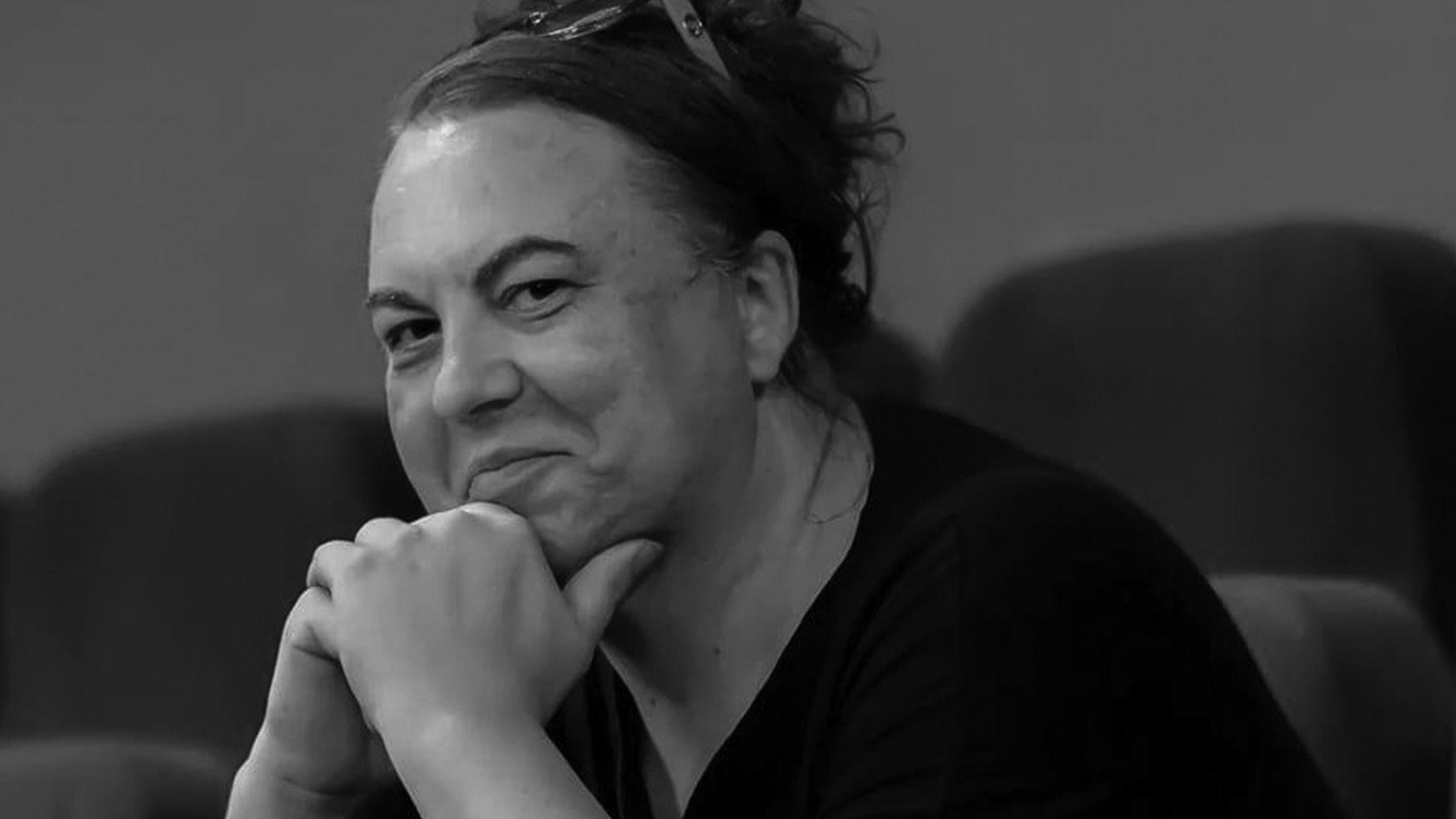
ÉVAD | SEASON
DRAGOMÁN GYÖRGY - TASNÁDI-SÁHY PÉTER
REGELE ALB | THE WHITE KING
RENDEZŐ | REGIA | DIRECTED BY MIHAELA PANAINTE
A kortárs magyar irodalom egyik legnagyobb nemzetközi sikerét, amelyet eddig harminc nyelvre fordítottak le, Tasnádi-Sáhy Péter színpadi adaptációjában Mihaela Panainte állítja színpadra.
Dragomán György regénye egy tizenegy éves fiú életének legnehezebb évét meséli el attól a pillanattól kezdve, hogy apját a Duna-csatorna munkatáborába viszik, egészen addig, amíg újra viszont nem láthatja. A hol vicces, hol tragikus történetekből kirajzolódik egy abszurd, de gyerekszemmel mégiscsak szép világ, amely inkább elemeiben, mint konkrét történelmében azonos a kora nyolcvanas évek Erdélyével és Romániájával. Hogyan dolgozza fel egy tizenegy éves kamaszfiú, ha apját a szeme láttára elhurcolják? Hogyan éli meg az apa hiányát és az elhurcolás köré épített családi hazugságokat vagy titkolt történeteket? Milyen remények éltetik a mindennapok amúgy sem könnyű kamaszviharaiban?
(Részlet a regény magyar kiadásának fülszövegéből)
Unul dintre cele mai mari succese internaționale ale literaturii maghiare contemporane, tradus în treizeci de limbi, este regizat de Mihaela Panainte, cu textul adaptat pentru scenă de Péter Tasnádi-Sáhy.
Romanul lui György Dragomán spune povestea celui mai dificil an din viața unui băiat de 11 ani, din momentul în care tatăl său este dus în lagărul de muncă de la Canalul Dunării și până când se reîntâlnește cu tatăl său. Poveștile, uneori amuzante, alteori tragice, dezvăluie o lume absurdă, dar totuși frumoasă, care, prin elementele sale mai degrabă decât prin istoria sa concretă, seamănă cu Transilvania și România de la începutul anilor 1980. Cum se descurcă un adolescent de unsprezece ani când tatăl său este luat în fața lui? Cum face el față absenței tatălui său și minciunilor familiei sau poveștilor tăinuite construite în jurul deportării? Ce speranțe îl susțin prin turbulențele și cotidianul adolescenței?
(Fragment din descrierea de pe coperta romanului de ediția maghiară)
One of the greatest international success of contemporary Hungarian literature, translated into 30 languages, is directed by Mihaela Panainte with the text being adapted to the stage by Péter Tasnádi-Sáhy.
György Dragomán's novel tells the story of an 11-year-old boy's most di cult year in life, from the moment his father is taken to the Danube Canal labour camp until he is reunited with his father. The stories, at times funny and at times tragic, reveal an absurd but still beautiful world, which, in its elements rather than in its concrete history, is more like Transylvania and Romania in the early 1980s.
How does an eleven-year-old teenage boy cope when his father is taken away in front of him? How does he cope with the absence of his father and the family lies or hidden stories built around the deportation? What hopes sustain him through the turbulent and everyday life of adolescence?
(Excerpt from the novel's blurb, Hungarian edition)

ÉVAD | SEASON
SŁAWOMIR MROŻEK
RENDEZŐ | REGIA | DIRECTED BY KERESZTES ATTILA
Sławomir Mrożek parodisztikus elemekkel, meghökkentő fordulatokkal teli groteszk játéka különböző értelmezési lehetőségeket kínál a színpad számára. Három nemzedék konfliktusáról szól, tehát abszurd családi komédia. De lehet a fasizmus, a terrorizmus veszélyeire figyelmeztető tragikomédia; lázadás és fegyelem, anarchia és rend ellentétpárjainak drámai modellje is; az új nemzedék hamleti töprengéseit, világmegváltó szándékait és eszmekeresését bohóctréfa álarcába öltöztető Shakespeare-parafrázis.
Színházi kalauz, szerk. Kékesi Kun Árpád, Dr. Pataki Istvánné – részlet
Mrożek Tangóját legutóbb negyven évvel ezelőtt, 1985-ben mutatta be a kolozsvári színház Tompa
Gábor rendezésében. A korabeli kritika az előadás néhány fontos kérdését jegyzi: egy kelet-európai értelmiségi család felbomlásának kegyetlen szatírája; a tragikum létjogosultságáról a huszadik századi drámák és groteszk bohózatok korában; a hatalom és szabadság korrelációja az élet és halál kérdéseinek távlatában.
2025-ben Keresztes Attila kínál új perspektívát a Tangó című dráma színpadra vitelében.
Piesa grotescă a lui Sławomir Mrożek, plină de elemente parodice și formulări surprinzătoare, permite o mare varietate de interpretări scenice. Este vorba despre conflictul dintre trei generații și, prin urmare, este o comedie familială absurdă. Dar poate fi, de asemenea, o tragicomedie care avertizează asupra pericolelor fascismului și terorismului; un model dramatic al contrariilor dintre rebeliune și disciplină, anarhie și ordine; o parafrază shakespeariană care îmbracă gândurile de tip Hamlet ale noii generații, intențiile de a schimba lumea și căutarea de idei sub forma unei farse bufonice.
Fragment – Színházi kalauz (Ghid de teatru), ed. Árpád Kékesi Kun, Dr. Istvánné Pataki
Tangoul lui Mrożek a avut ultima premieră la Teatrul Maghiar de Stat Cluj acum patruzeci de ani, în 1985, în regia lui Gábor Tompa. Criticii vremii au remarcat câteva dintre temele importante ale spectacolului: satira crudă a dezintegrării unei familii de intelectuali din Europa de Est; legitimitatea tragediei în epoca dramaturgiei secolului XX și a farsei grotești; corelația dintre putere și libertate din perspectiva întrebărilor referitoare la viață și moarte.
În 2025, Attila Keresztes oferă o nouă perspectivă prin punerea în scenă a piesei Tango.
Sławomir Mrożek's grotesque play, full of parodic elements and astonishing turns of phrase, o ers a variety of possible stage interpretations. It is about the conflict between three generations, and is therefore an absurd family comedy. But it can also be a tragicomedy warning of the dangers of fascism and terrorism; a dramatic model of the opposites of rebellion and discipline, anarchy and order; a Shakespearean paraphrase dressing up the new generation's Hamlet-like musings, world-changing intentions and search for ideas in the guise of a clown's farce.
Excerpt – Színházi kalauz, ed. Árpád Kékesi Kun, Phd. Istvánné Pataki
Mrożek's Tango was last premiered 40 years ago, in 1985, at the Hungarian Theatre of Cluj directed by Gábor Tompa. The critics of the time noted some of the important themes of the production: the cruel satire of the disintegration of an intellectual family in Eastern Europe; the legitimacy of tragedy in the age of twentieth-century drama and grotesque farce; the correlation between power and freedom from the perspective of questions concerning life and death.
In 2025, Attila Keresztes o ers a new perspective in his staging of Mrożek's play Tango.
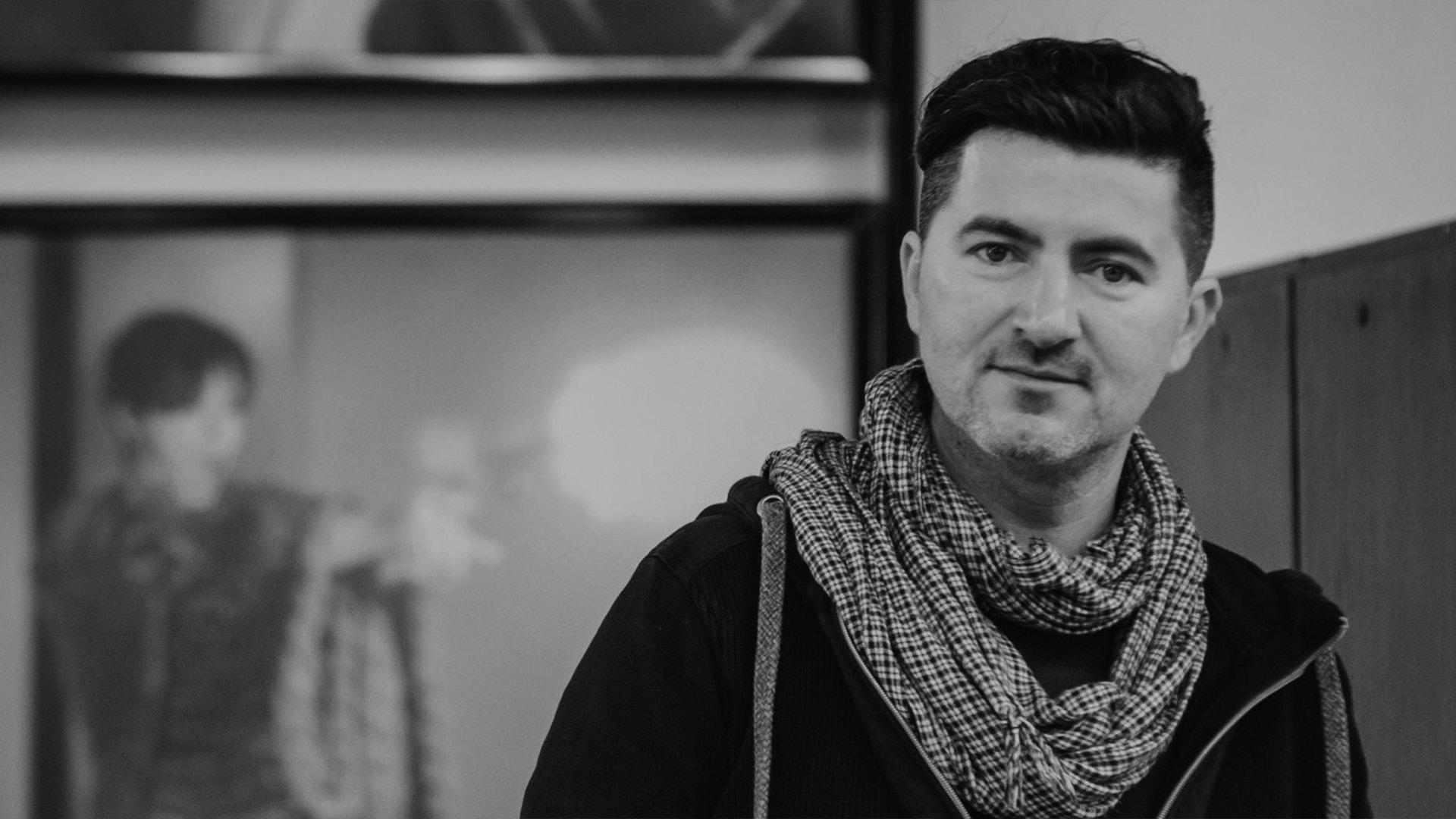
ÉVAD | SEASON
THORNTON WILDER
ORAȘUL NOSTRU | OUR TOWN
RENDEZŐ | REGIA | DIRECTED BY JESCA PRUDENCIO
Ha ma meghalnál, melyik napot élnéd újra az elmúlt életedből?
A mi kis városunk (tetszőleges helyszín) olyan hely, ahol legszebb elképzeléseink alapján állt meg az idő. Nincs fenyegető forgalom, az emberek gyalog járnak, köszönnek egymásnak és valóban kedvesen elcseverésznek; az apákat megbecsülik, az anyák természetes bölcsességgel vezetik a ház életét, látják el a családot. A Gibbs és Webb család élete szimmetrikusan halad előre: középiskolás gyermekeik, Emily és George egymásba szeretnek, és mindenféle drámai körülménytől mentesen, a két család áldását adja közös életükre. Idilli, mint egy naplemente, amely kilenc éven át tart az esküvő óta. A kilencedik évben azonban eljön az éjszaka: Emily belehal gyermekük szülésébe, szerető férjét és kisfiát hagyva maga után. Ám a halál szomorúságában ott rejlik az életöröm is: Emily – ahogy minden halottnak kijár – lehetőséget kap újraélni életének egy általa választott napját, hogy még egyszer megízlelje, mit jelent élni, szeretni, hálát érezni.
Dacă ai muri astăzi, care ar fi ziua pe care ai retrăi-o din viața ta anterioară?
Orașul nostru (locație opțională) este un loc în care timpul s-a oprit în imaginarul nostru cel mai viu.
Nu există trafic amenințător, oamenii merg pe jos, se salută reciproc și discută cu adevărat amiabil; tații sunt apreciați, mamele conduc casa cu înțelepciune înnăscută, având grijă de familie. Viețile familiilor Gibbs și Webb avansează simetric: copiii lor de vârstă liceală, Emily și George, se
îndrăgostesc și, lipsite de orice circumstanțe dramatice, cele două familii își dau binecuvântarea
pentru ca cei doi să își trăiască viața împreună. Idilic ca un apus de soare care a durat nouă ani de la nunta lor. Dar în al nouălea an, vine amurgul: Emily moare dând naștere copilului lor, lăsându-și în urmă soțul iubitor și băiețelul. Dar în tristețea morții, există și bucuria vieții: Emily are ocazia să retrăiască o zi din viața ei, așa cum ar trebui să facă toți morții, să guste încă o dată ce înseamnă să trăiești, să iubești, să simți recunoștință.
If you died today, which day of your past life would you relive?
Our Town (optional location) is a place where time has stood still in our most vivid imagination. There is no looming tra c, people walk, greet each other and genuinely chat amiably; fathers are appreciated, mothers run the house with innate wisdom, taking care of the family. The lives of the Gibbs and Webb family move forward symmetrically: their high school children, Emily and George, fall in love, and free of any dramatic circumstances, the two families give their blessing for the two to live their life together. Idyllic as a sunset that has lasted for nine years since their wedding. But in the ninth year, the twilight comes: Emily dies giving birth to their child, leaving behind her loving husband and baby boy. But in the sadness of death, there is also the joy of life: Emily is given the opportunity to relive a day of her life, as all the dead should, to taste once again what it means to live, to love, to feel gratitude.

A 2024/2025-ös évad első felében, november 2-17. között a Kolozsvári Állami Magyar Színház ismét helyet ad a kétévente szervezett Interferenciák Nemzetközi Színházi Fesztiválnak.
Az évad második felében, június 2-8. között a színház Harag György Emlékhéttel tiszteleg a 100 éve született, 40 éve elhunyt korszakos rendező munkássága előtt. Harag György Európa-szerte elismert rendező a romániai színház egyik kiemelkedő mestere, aki a kolozsvári színházhoz 1947 óta kötődött, ahol több jelentős előadást állított színpadra.
În prima jumătate a stagiunii 2024/2025 în perioada 2-17 noiembrie, Teatrul Maghiar de Stat Cluj va găzdui din nou evenimentul bianual Festivalul Internațional de Teatru Interferențe.
În a doua parte a stagiunii, între 2 și 8 iunie, teatrul va aduce un omagiu regizorului de renume internațional György Harag, născut în urmă cu 100 de ani și decedat în urmă cu 40 de ani, care a fost unul dintre cei mai remarcabili maeștri ai teatrului românesc, fiind asociat cu Teatrul Maghiar încă din 1947, la Cluj a pus în scenă cele mai importante spectacole ale sale.
During the first half of the 2024/2025 season, between November 2-17, the Hungarian Theatre of Cluj will once again host the biannual Interferences International Theatre Festival. In the second half of the season, between June 2 and 8, the theatre will pay tribute to internationally renowned director György Harag who was born 100 years ago and died 40 years ago, and who was one of the most outstanding masters of Romanian theatre, having been associated with the Hungarian Theatre of Cluj since 1947, when he staged his most important productions in Cluj.
& LACZÓJULI SAVABORSA
A Livingroom egy kötetlen beszélgetéssorozat, amely pár éves kihagyás után a 2023/2024-es évadban indult újra a már jól ismert forgatókönyv szerint. Idén új szereplőkkel, új köntösbe öltöztetett helyszínnel, havi rendszerességgel kerül megrendezésre. Ilyenkor a színház büféje a vendégek és a színészek közös nappalijává alakul, ahol a meghívott színész életútja mellett élvezhetjük a színészekből és színházi munkatársakból alakult zenekar dalait, és Laczó Juli főztjét, aminek elkészítésében a szorgos kukták segítenek. A Livingroom estéjén minden a meghívottról szól: a zenekar a kedvenc dalait játssza, és azt ehetjük, amit Juli személyre szabottan neki készít.
A büfé közösségi térré válik, megszűnik néző és színész között a színpad határa, és mindenki élvezheti a kötetlen beszélgetést, a finom falatokat és a jó muzsikát.
Livingroom este o serie de discuții informale care, după o pauză de câțiva ani, s-a relansat în stagiunea 2023/2024 după un scenariu cunoscut. Anul acesta, cu o nouă distribuție, într-o locație redecorată, evenimentul va avea loc lunar. Cu aceste ocazii, bufetul teatrului se va transforma într-un salon pentru invitați și actori, unde, alături de biografia actorului invitat, vă veți putea bucura de cântecele orchestrei de actori și ale personalului teatrului și de bucatele lui Juli Laczó, asistat de o echipă de bucătari harnici. Seara va fi dedicată invitatului sau invitatei: orchestra se cântă melodiile sale preferate, iar noi putem gusta mâncarea pe care Juli a pregătit-o special pentru el sau ea. Bufetul devine un spațiu comun, estompând granițele dintre public și actor, unde toată lumea este invitată să se bucure de conversații informale, gustări savuroase și muzică bună.
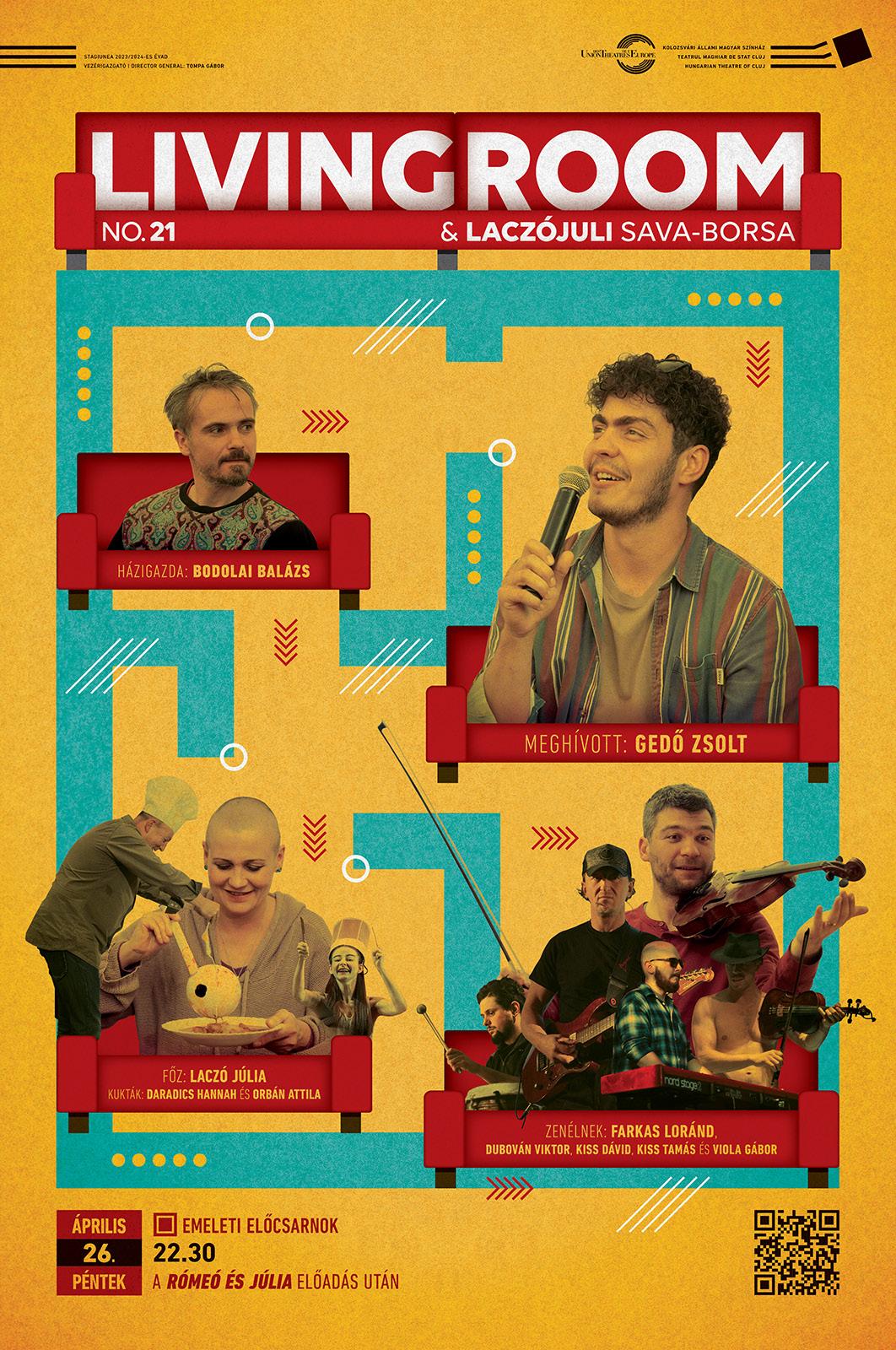

Livingroom is a series of informal talks which, after a few years' hiatus, re-launched in the 2023/2024 season according to a familiar script. This year with new guests, in a revamped venue, it will take place monthly. On these occasions, the theatre's bu et will be transformed into a living room for guests and actors, where, alongside the guest actor's biography, you can enjoy the songs of the orchestra of actors and theatre sta , and the cooking of Juli Laczó, assisted by a team of hard-working cooks. The evening will be all about the guest: the band playing his/her favourite songs and eating what Juli has made especially for him/her.
The bu et becomes a communal space, blurring the boundaries between audience and actor, where everyone is invited to enjoy informal conversation, tasty snacks and good music.
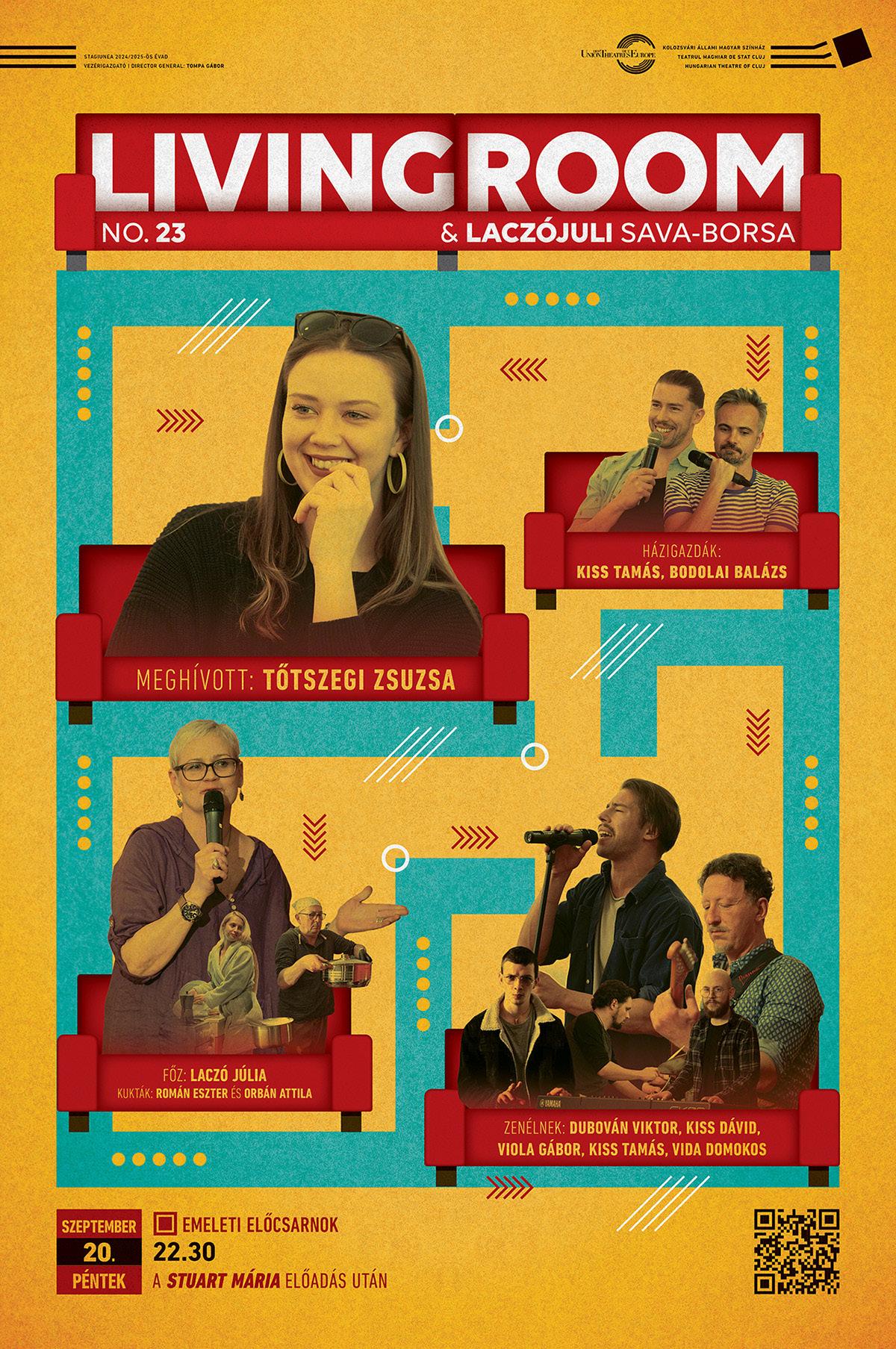
Az ESziK vagy isszák? színházi nevelési program minden korosztály számára a színház bármelyik műsoron lévő előadásához önismereti jellegű felkészítő és feldolgozó csoportfoglalkozásokat biztosít.
Érdeklődés, jelentkezés a 0743341781-es telefonszámon, vagy a tunde.kocsis@huntheater.ro címen.
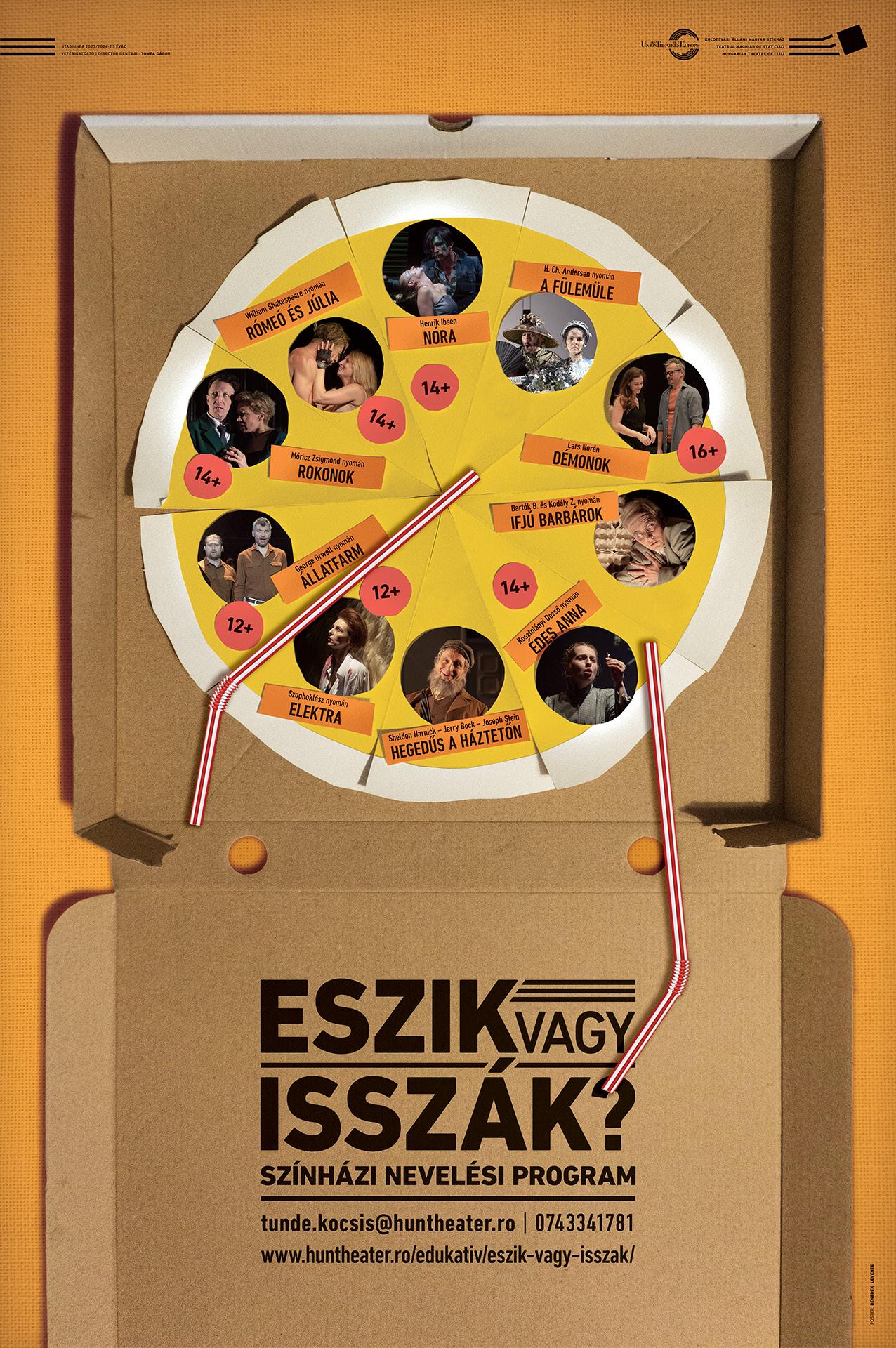
Programul de educație teatrală Cu ce se mănâncă?* oferă pentru toate vârstele sesiuni de autodescoperire, pregătire și procesare în grup pentru oricare dintre producțiile teatrului din program.
*Evenimentul se desfășoară în limba maghiară.
The What' s It All About?* theatre in education programme provides self-discovery group preparation and processing sessions for any of the theatre's productions on the programme for all ages. *The program is held in Hungarian.


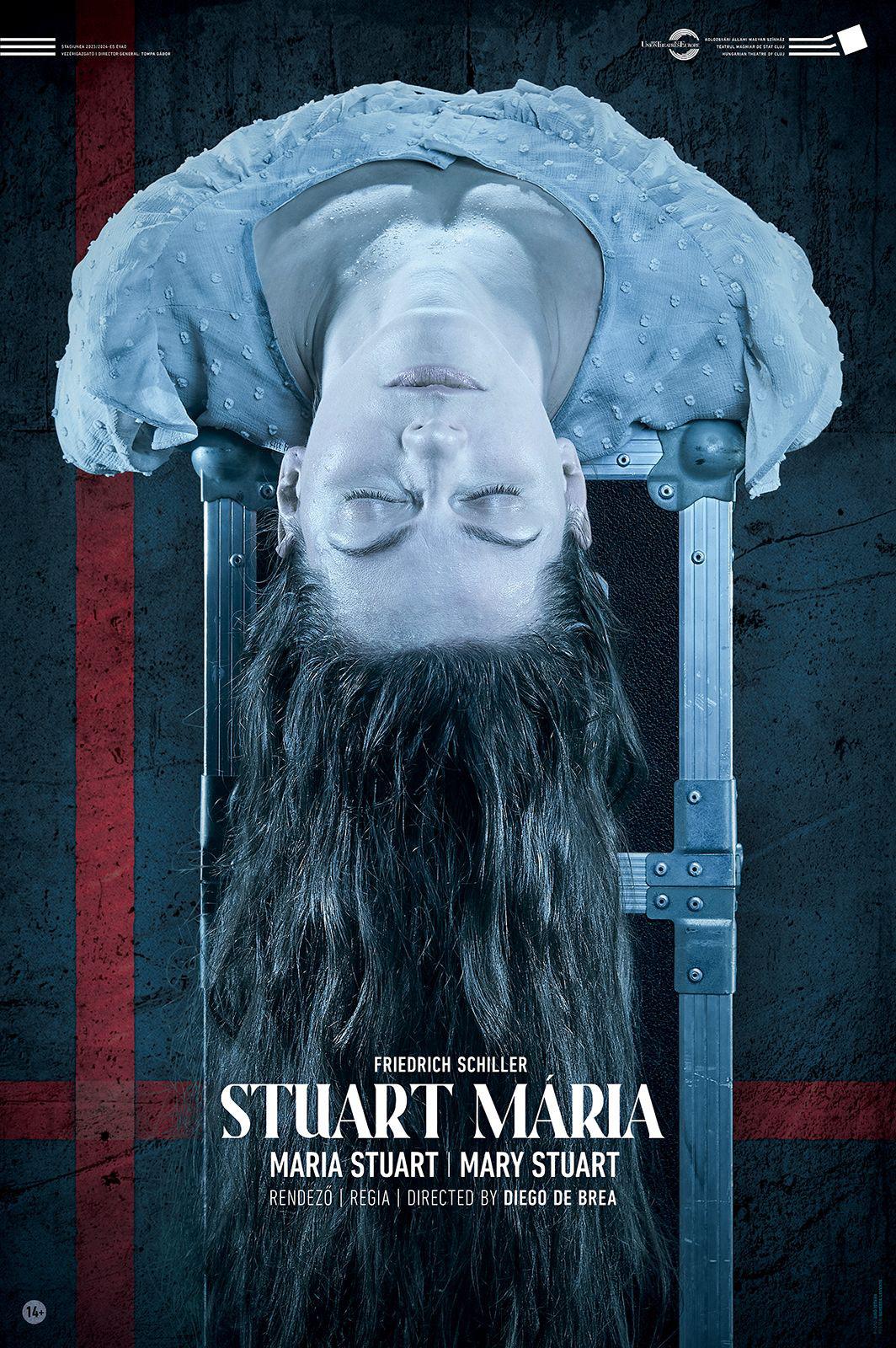
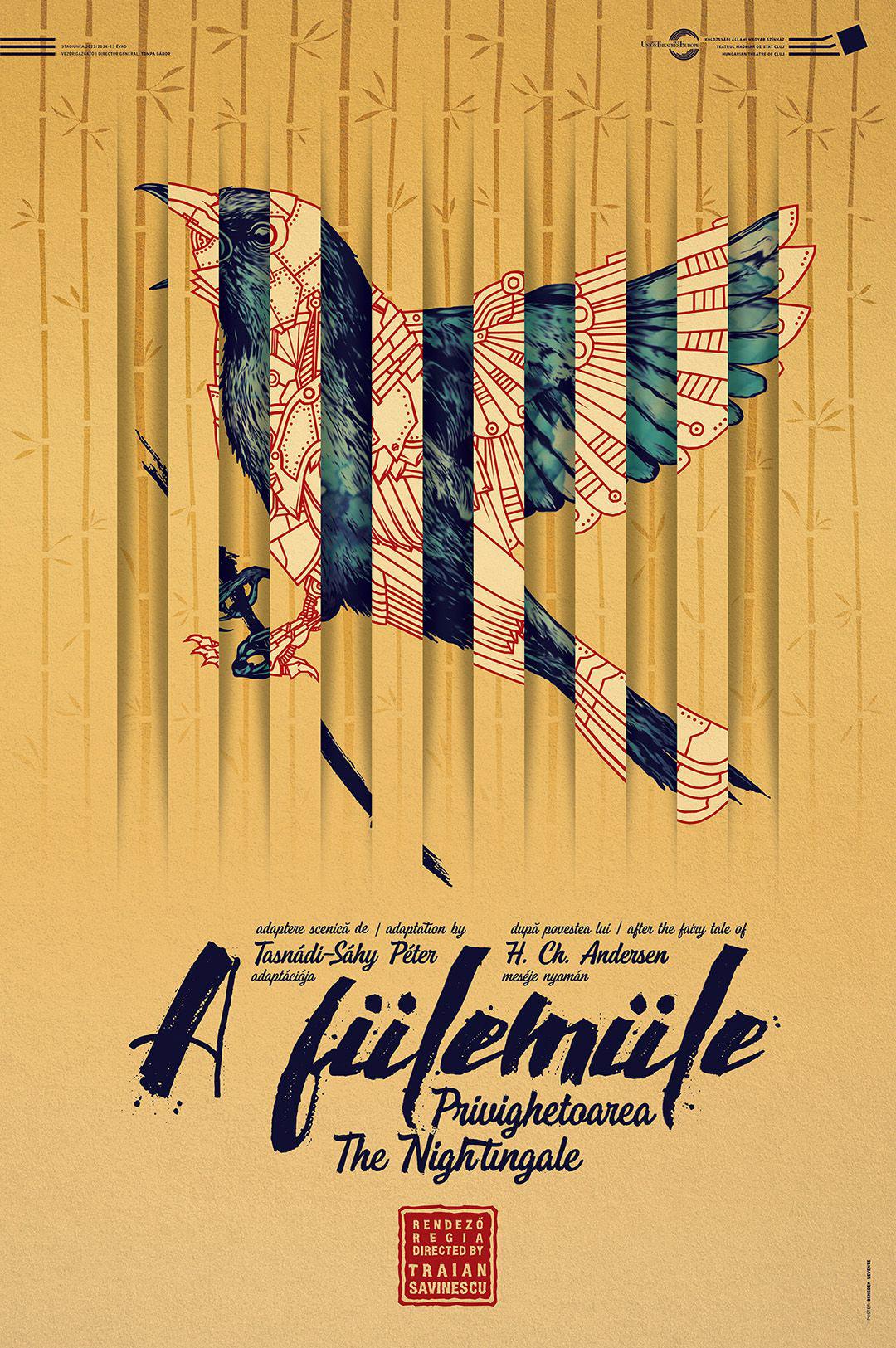
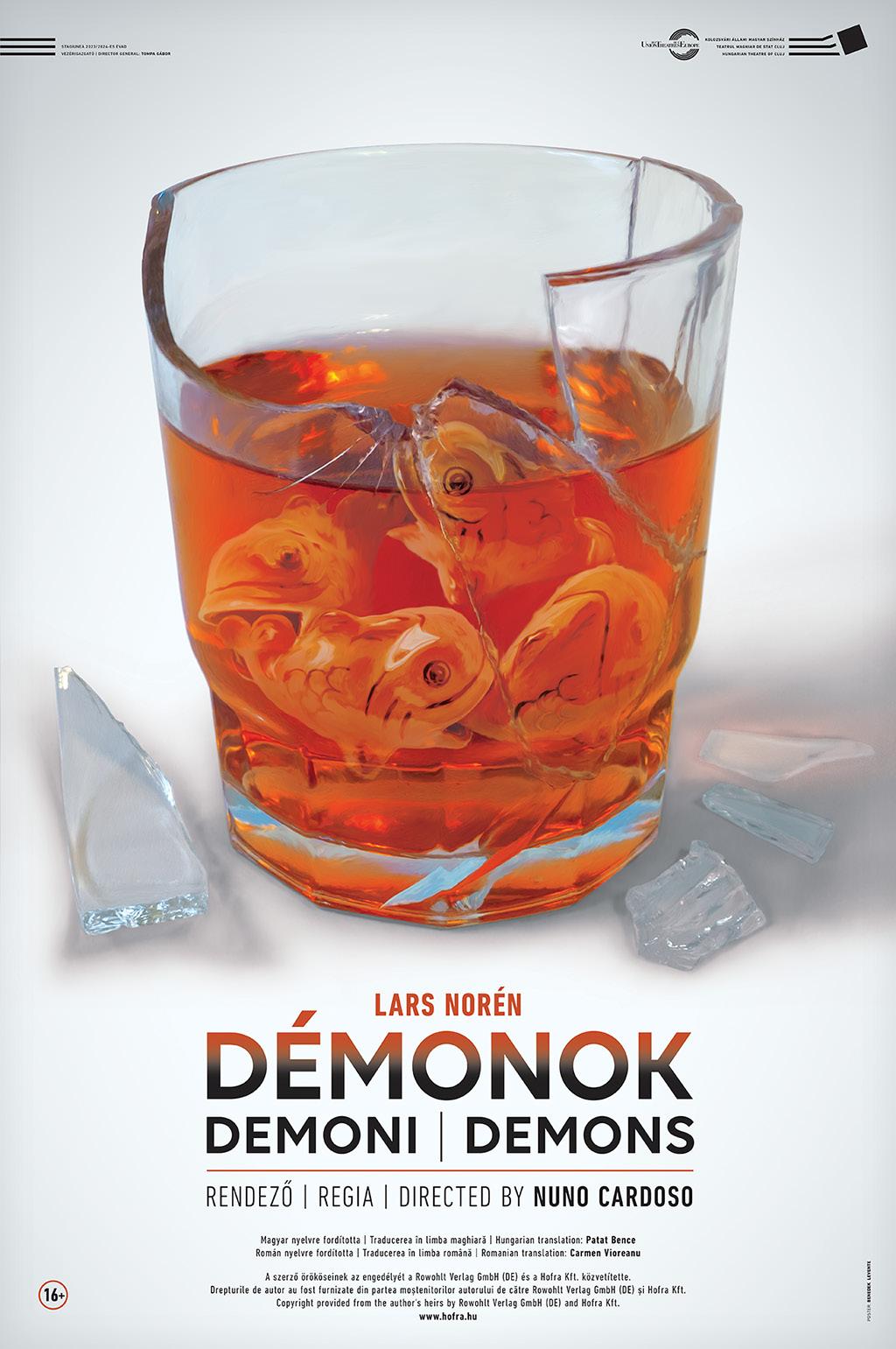
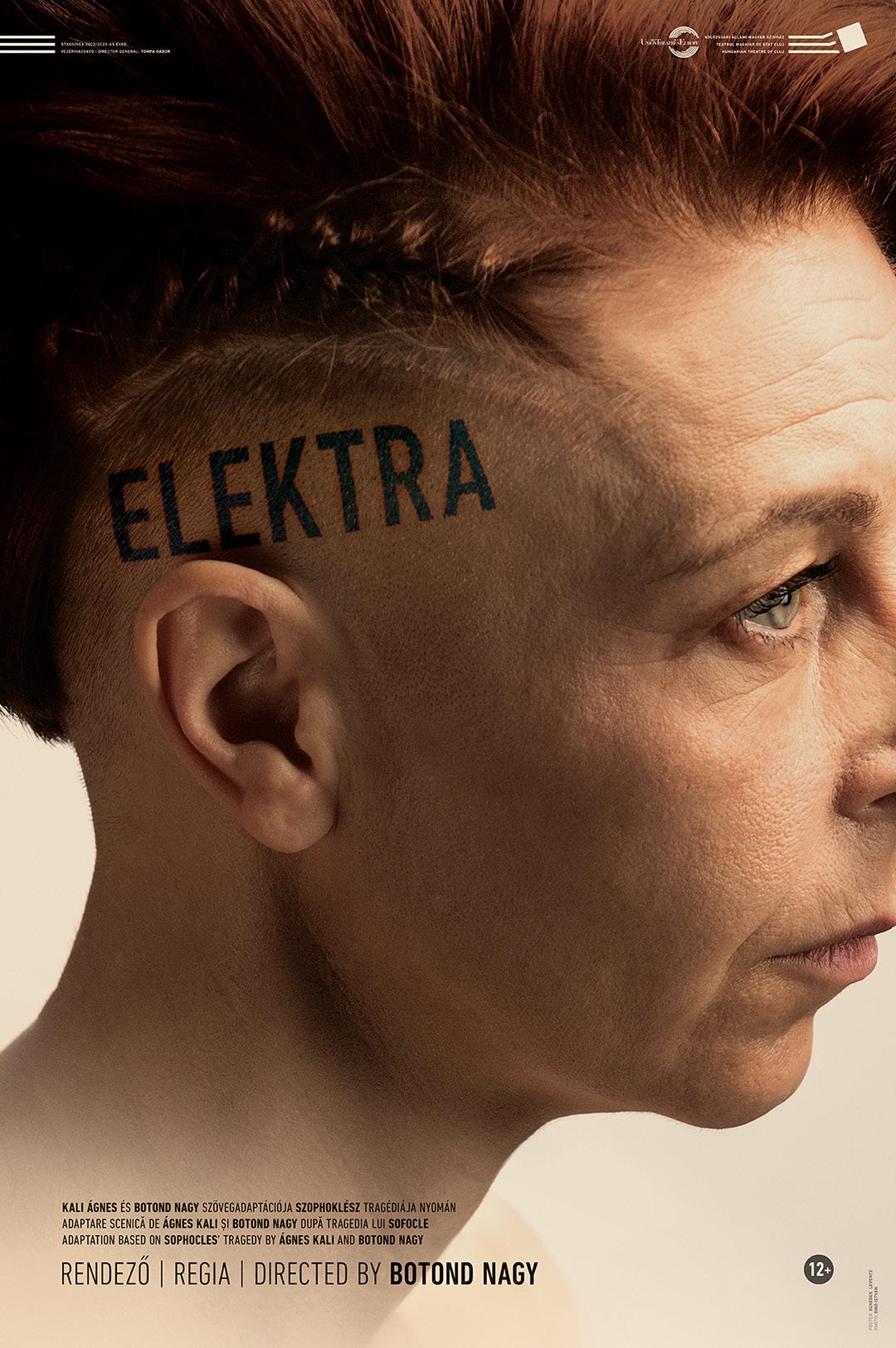
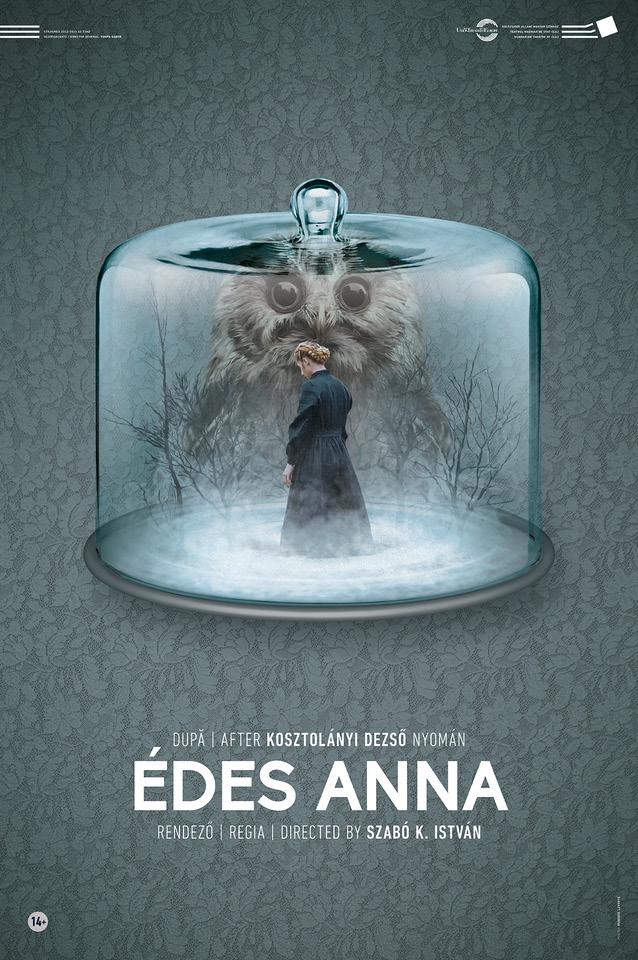
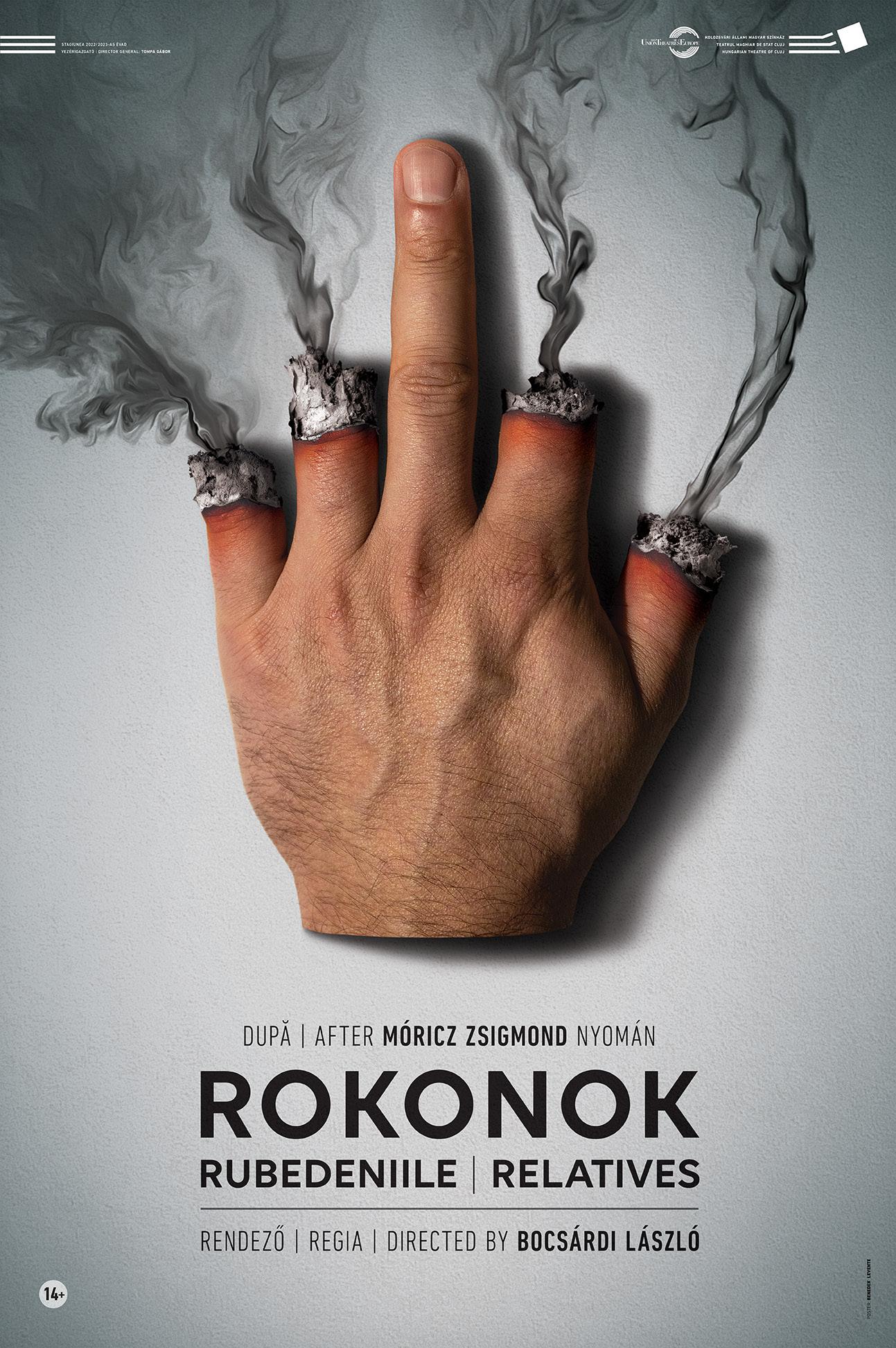
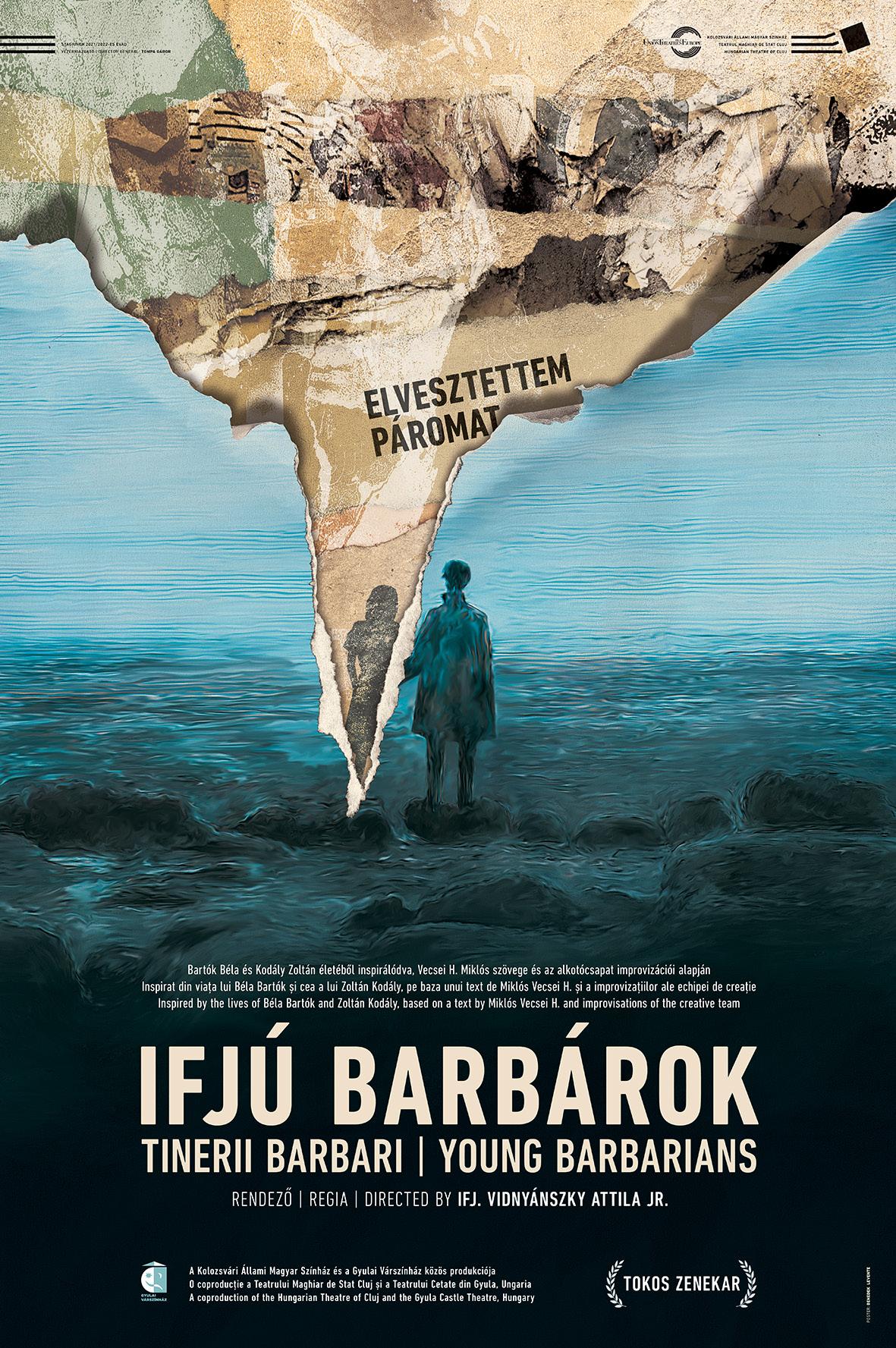

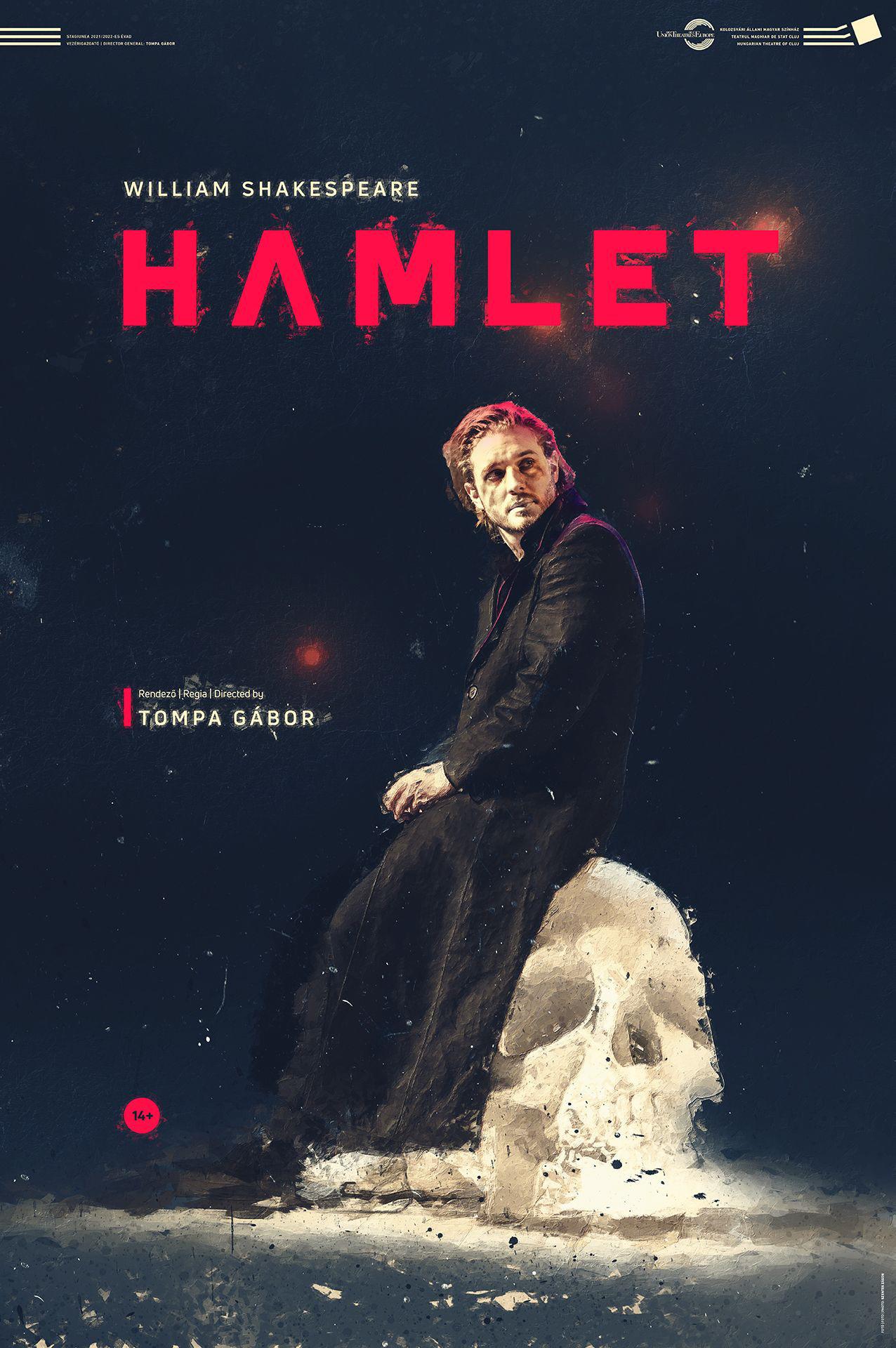


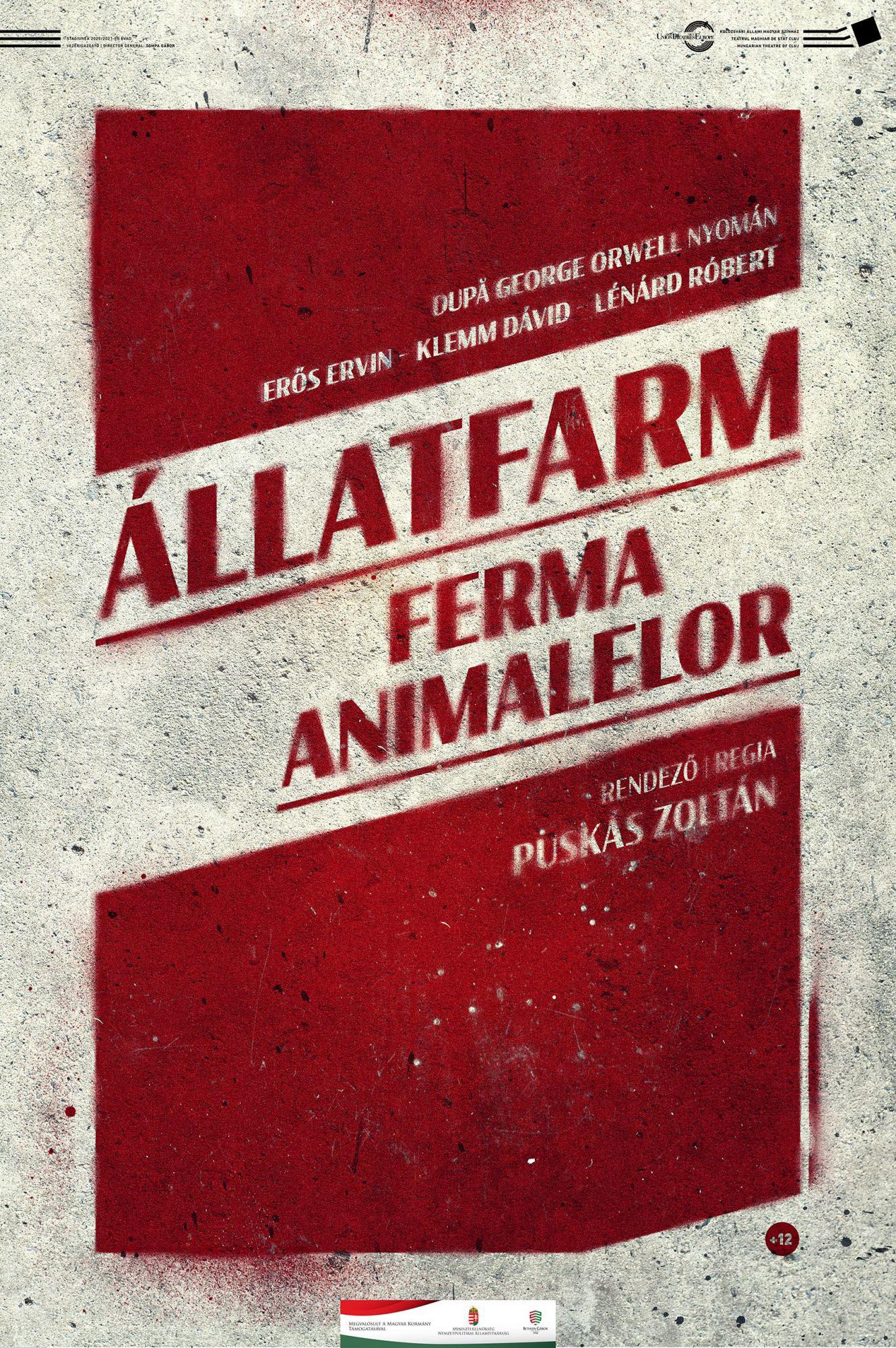
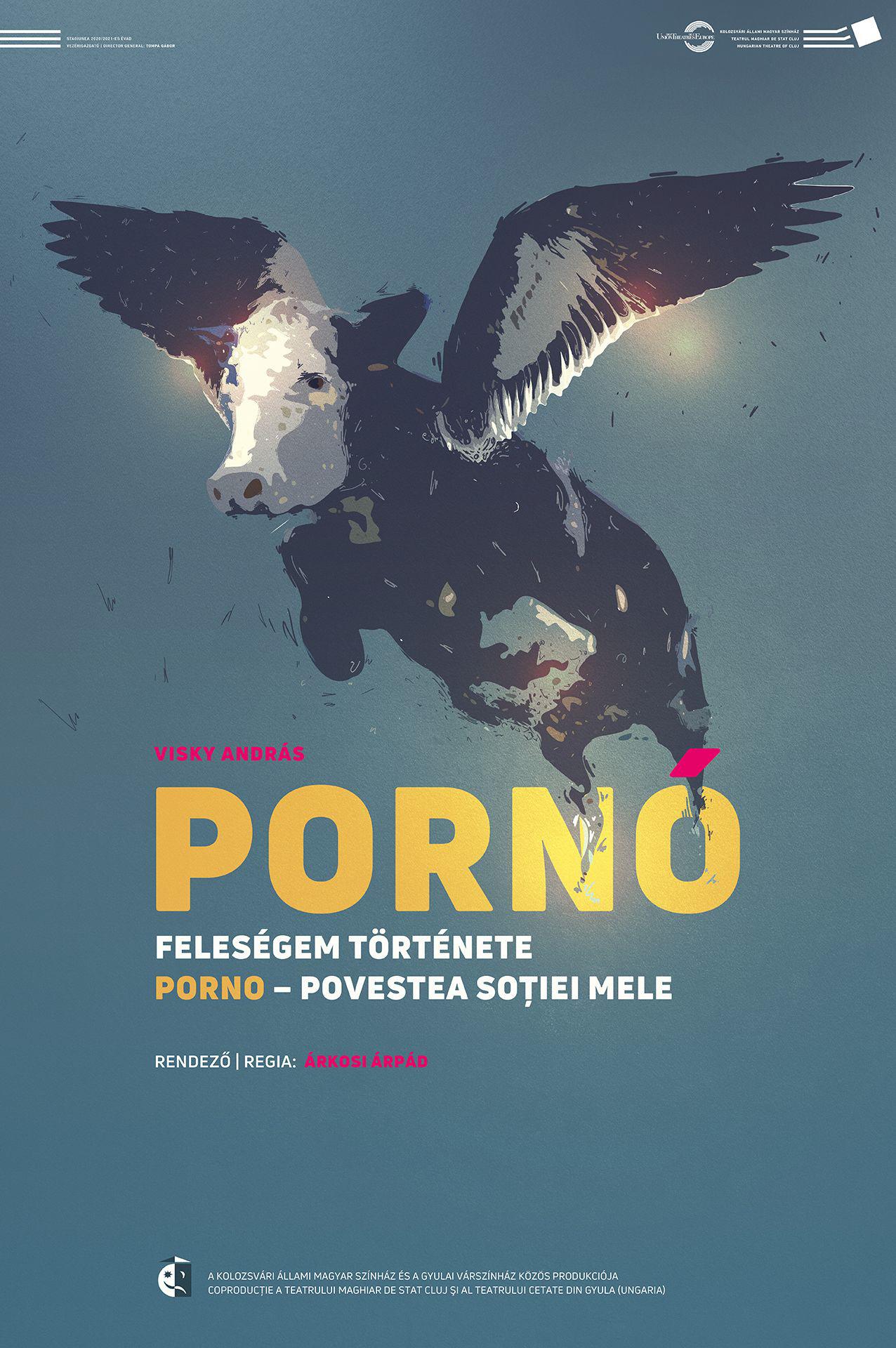
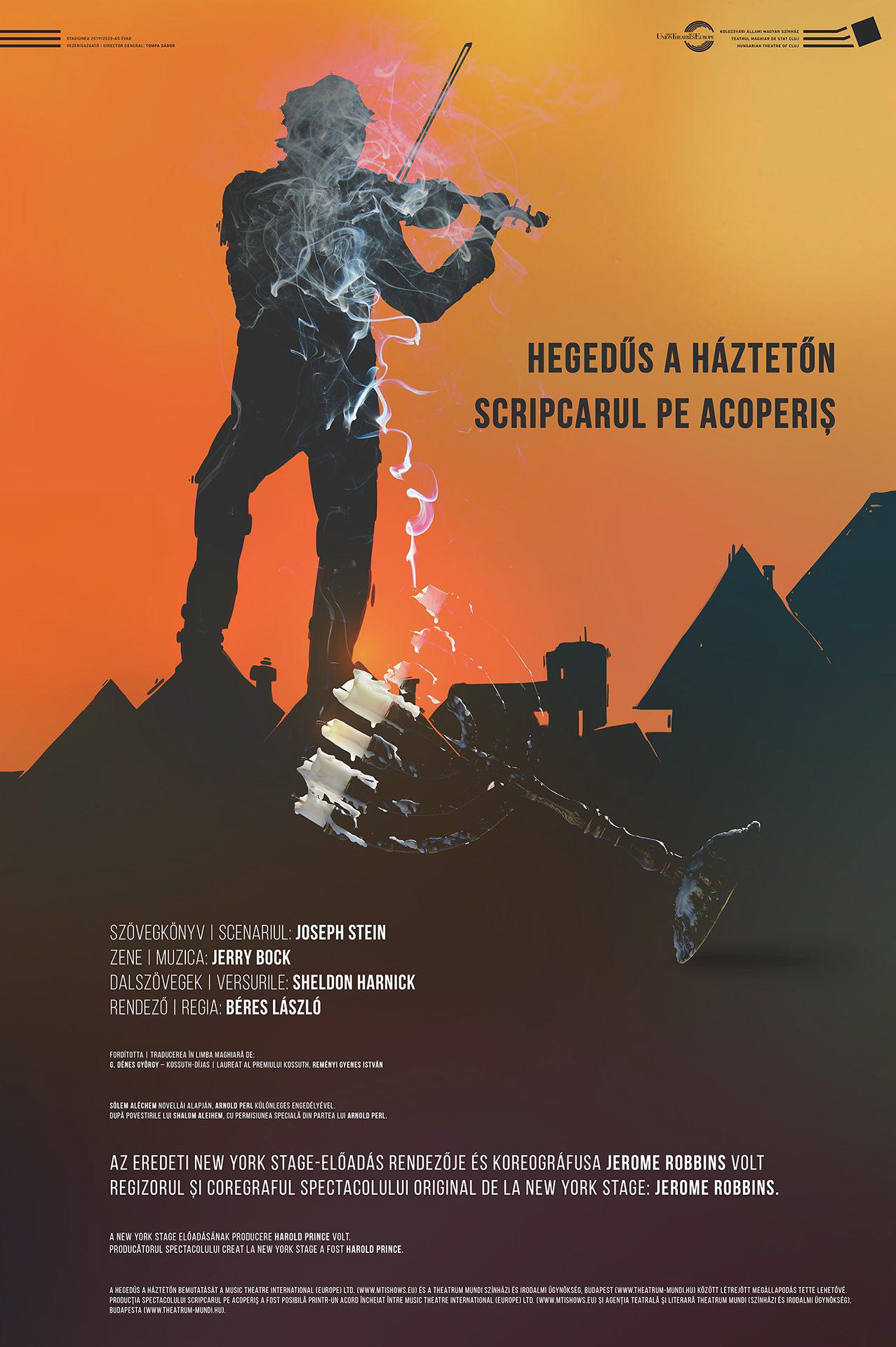


vezérigazgató, az UTE elnöke
director general și președinte UTE
artistic and managing director & UTE president

művészeti aligazgató
director artistic adjunct
associate artistic director

programigazgató
director de programe
programme director

technikai igazgató
director tehnic
technical director

gazdasági igazgató
economic manager
director economic


András Gedeon






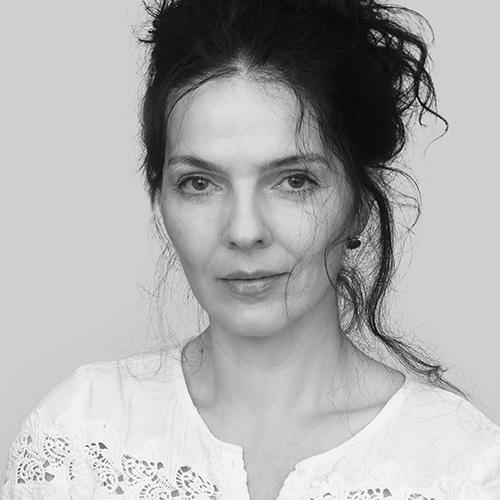
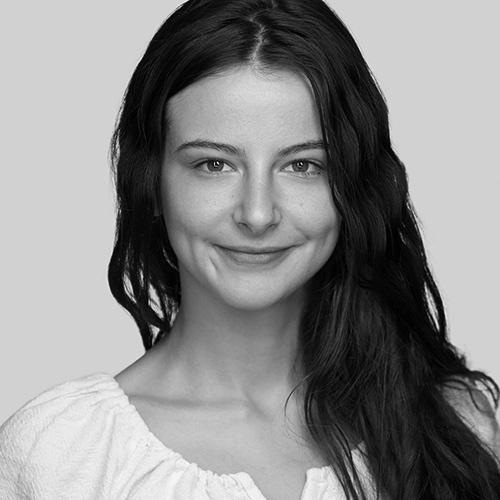
Daradics Hannah

Demeter András
István

Farkas Loránd



Dimény Áron

Fogarasi Alpár

Zsolt











Pánczél Lilla

Pethő Anikó
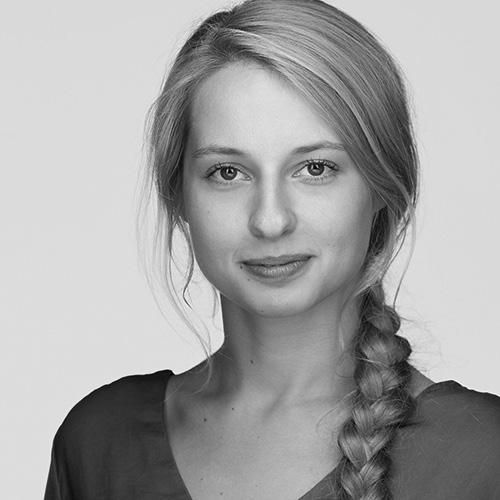






MARKETING IRODA | BIROUL MARKETING | MARKETING OFFICE
Szepessy Katalin – irodavezető, protokoll | șef birou, protocol | head of o ce, guest relations
Vizi Abigél – irodalmi titkár, kiadványok | secretar literar, publicații | literary secretary, publications
Ozsváth Zsuzsa – irodalmi titkár, Instagram | secretar literar, Instagram | literary secretary, instagram
Vajna Noémi – irodalmi titkár | secretar literar| literary secretary
Pászka Gáspár – sajtókapcsolatok, online kommunikáció | relații cu presa, online media | public relations, online media
Márton Noémi Éva – közönségkapcsolatok | organizator spectacole | audience development
Kocsis Tünde – edukatív programok, dokumentációs tár | programe educative, responsabil arhivă documentară | educational programs, senior archivist
TITKÁRSÁG
ARTISTIC SECRETARY – STAGE MANAGEMENT
Csengeri Orsolya – rendezőasszisztens | asistent de regie | director’s assistant
Képíró Dorottya – rendezőasszisztens | asistent de regie | director’s assistant
Albert Enikő – ügyelő | regizor tehnic | stage manager
Zongor Réka – ügyelő | regizor tehnic | stage manager
SZÍNPADI MUNKATÁRSAK | PERSONAL SCENĂ | STAGE CREW
Groza Romeo – fővilágosító | maestru de lumini | senior lighting manager
Bencze Tamás – világosító | lumini | lights
Maier Sándor – világosító | lumini | lights
Porkoláb Zsófia – világosító | lumini | lights
Buksa Péter – főhangosító | maestru de sunet | senior sound manager
Dubován Viktor Ervin – hangosító | sunet | sound
Kiss Dávid – hangosító | sunet | sound
Györ y Zoltán – öltöztető | costumier | wardrobe assistant
Krizbay Erika– öltöztető | costumier | wardrobe assistant
Györ y Edith – öltöztető | costumier | wardrobe assistant
Szöllősi-Rusz Hajnal-Andrea – öltöztető | costumier | wardrobe assistant
Tamás Orsolya – smink | machior | make-up
Vernes Ilonka – fodrász | coafeză | hairstylist
Szöllősi Helga – kellékes | recuziter | propman
Csiszér József – színpadmester | maestru scenă | head of stage crew
Antal-Dobra József – díszletmunkás | mânuitor de decor | stage hand
ifj. Csiszér József – díszletmunkás | mânuitor de decor | stage hand
Boncz Zoltán – díszletmunkás | mânuitor de decor | stage hand
Deák Attila – díszletmunkás | mânuitor de decor | stage hand
Kerekes Dávid – díszletmunkás | mânuitor de decor | stage hand
Nagy János – díszletmunkás | mânuitor de decor | stage hand
Vinte Mihály – díszletmunkás | mânuitor de decor | stage hand
Varga Csaba Zoltán – díszletmunkás | mânuitor de decor | stage hand
GYÁRTÁS | PRODUCȚIE | PRODUCTION TEAM
Tenkei Tibor – gyártásvezető | director producție | production manager
Bocskai Gyopár – díszlet- és jelmeztervező asszisztens | asistent scenografie | set and costume designer's assistant
Chirilă Lucian – díszletfestő | pictor executant | scene painter
László Csaba – lakatos | lăcătuș | metal worker
Pușcariu Ovidiu Emil – lakatos | lăcătuș | metal worker
Oltyán Péter Csaba – asztalos | tâmplar | carpenter
Tamás Zoltán György – asztalos | tâmplar | carpenter
Bálint Tibor – szabó | croitor | tailor
Jenei Márton – szabó | croitor | tailor
Illés Ernő – szabó | croitor | tailor
Nagy Beczkay Gizella – varrónő | croitoreasă | tailoress
Szalma Enikő – varrónő | croitoreasă | tailoress
Tóbiás Ildikó – varrónő | croitoreasă | tailoress
Szenes Beáta Kinga – mosónő | spălătoreasă | laundress
Szikszai László – jogtanácsos | consilier juridic | legal advisor
Ágoston Árpád – adminisztrátor | administrator
Kovács András Péter – rendszergazda | administrator rețea | network administrator
Szilveszter Editha – irodavezető, könyvelőség | șef birou, contabilitate | o ce manager, accountant
Bede Dóra – közgazdász | economist
Turgyán Ilona – könyvelő | contabil | accountant
Boros Júlia – közgazdász | economist
Hetman Anikó – közgazdász | economist
Gyurka Anikó – pénztáros | casieră | cashier
Mucsi Ágnes – jegypénztáros | casieră | box o ce manager
Borsos Emőke Réka – adminisztrációs titkárnő | secretar administrativ | administrative
secretary
Rusu Adela Simona – belső ellenőr | audit intern | auditor
György Katalin – irodavezető, beszerzési és szállítási osztály | șef birou – achiziții publice
și transport | o ce manager – public procurement and transport
Kádár Hanga – beszerzési közgazdász | economist achiziții publice | purchasing economist
Barta András – szállítási referens | coordonator transport | transport coordinator
Jenei Enikő – raktáros | magaziner | warehouseman
Ambrus Árpád – gépkocsivezető, beszerző | şofer, achiziții publice | driver, public procurement
Varga Márton Csaba – gépkocsivezető | şofer | driver
Bancsi Emanuel – karbantartó | întreținere | maintenance
Márton Sándor – tűzoltófőnök | șef pomier | head of fire department
Gábor Elemér – tűzoltó | pompier | fireman
Lukács Loránd László – tűzoltó | pompier | fireman
Tamás Iuliu – tűzoltó | pompier | fireman
TEREMSZEMÉLYZET | PERSONAL DE SALĂ | HOUSE PERSONNEL
Deák Vanda-Tamara – teremfelelős | șef sală | house personnel manager
Domokos Irisz-Kamilla – ültető | plasator | house personnel assistant
Hunyadi Ingrid Kincső – ültető | plasator | house personnel assistant
Incze Izabella-Noémi – ültető | plasator | house personnel assistant
Sájter Szabolcs-Zsolt – ültető | plasator | house personnel assistant
Ungvári Szende-Etelka – ültető | plasator | house personnel assistant
KISEGÍTŐ SZEMÉLYZET | PERSONAL DE ÎNTREȚINERE | CLEANING PERSONNEL
Farkas Erzsébet
Horváth Alice Zenta
Nagy-Jakab Melinda
Kerekes Piroska
Török J. Gyöngyi